
In this blog series, we connect with leaders and team members to ask them five questions about what they do, who they are, and how their work impacts our communities. This time, we sat down with Alex Alsup, Senior Director of Housing Stabilty at the Rocket Community Fund. Alex talks about the challenges facing housing stability in Detroit, and how our housing strategy in our hometown will serve as a blueprint to scale our national footprint.
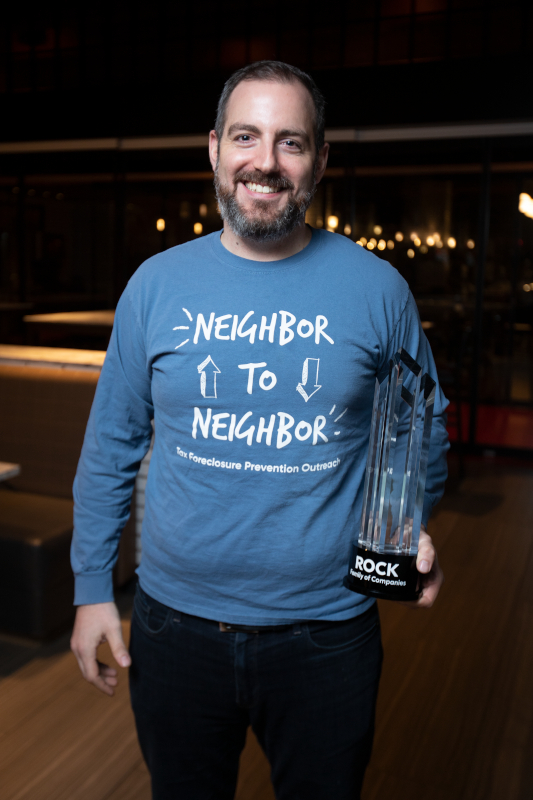
Alex Alsup: I moved to Detroit in 2011 from Brooklyn, NY because I was interested in the housing situation here and how homes had become so devalued. The people doing the most interesting work on that were at Loveland Technologies (now known as Regrid). Loveland was developing parcel mapping software to track and analyze the annual tax foreclosure auctions where thousands of Detroit homes were often being sold at rock bottom prices of a few hundred dollars.
The intersection of housing systems, technology, data and community impact were interesting to me, so I became Chief Product Officer at Loveland to develop their software and better understand what was happening in Detroit. We worked extensively with the Family of Companies when Dan was chair of the Detroit Blight Removal Task Force. So when I decided to move on from software development to focus on housing policy and systems, there was nowhere I’d rather do that from than the Family of Companies.
Housing instability is a complex problem. Because there are so many overlapping challenges, one of the biggest issues is how stakeholders go about developing solutions. The challenges on the ground are often flattened out and presented as one-dimensional problems with one-dimensional solutions. That oversimplification can lead to solutions that do more harm than good.
Part of why I love the Rocket Community Fund is that how we go about our work is informed by the ISMs. The ISMs stress humility, observation, and client service. That is how you solve complex problems – from the bottom up, not the top down – while putting the experience of the individual above all else, and our own preconceived notions in the back seat.
As our former mayor, Coleman Young, said in his autobiography, Hard Stuff: “In the evolutionary urban order, Detroit today has always been your town tomorrow.”
Too many people dismiss the challenges and problems Detroit has faced as unique to this city, which is condescending and wrong. Everyone is Detroit. The lessons you can learn here can extend to the rest of the country if you’re willing to accept the blueprint for urban development found in Detroit has been replicated in cities across the country.
The creation of the Detroit Tax Relief Fund, which will eliminate the property tax debt of 20,000 Detroit homeowners, was a wonderful development. The same goes for the Make it Home program that has helped 1,100 tenants become homeowners after facing the loss of their home due to property tax foreclosure. But it’s always the person-to-person experiences that are most rewarding. Just last month, I happened to call a homeowner north of Hamtramck who lost her furnace and hot water tank during the summer’s floods and was heating her home by running the burners on her gas stove. Our Make it Home repair program was able to help her replace her furnace and hot water tank within a couple weeks at no cost to her and by Christmas she had safe heat and hot water in her home again.
Well, I of course love their music, aesthetic, and vibe. The Wu are also a great case study in the power of teams. Rza (de facto leader of the Wu-Tang Clan) knew that the sum of the Wu-Tang Clan would be greater than its parts individually and executed on that vision, bringing the team along with him (if not always willingly). So, you know, when you’re responsible for a team you have to ask yourself, “WWWTD?” – What Would Wu-Tang Do?


“We are lucky to have thousands of team members who give of their most valuable resource – their time and talents – to impact countless lives and help make our communities stronger.” — Laura Grannemann, Executive Director of the Rocket Community Fund.

The phrase “it takes a village” is especially relevant when it comes to our small but mighty Volunteering and Giving team, who empower our 15,000 team members to create lasting community impact through a wide variety of diverse engagement opportunities. We amplify our team members’ motivation to serve our communities by providing them with flexible, fun ways to make a positive impact. We offer Rocket team members unlimited volunteer hours for company-sponsored events and host several large-scale fundraisers throughout the year. During National Volunteer Month, for example, hundreds of Detroit team members participate in Life Remodeled’s Six Day Project to address blight and beautify local neighborhoods. In Phoenix, team members regularly volunteer with Habitat for Humanity, assisting in home builds, assembling furniture and landscaping to ensure homes are move-in ready for families. Whether it’s solo or group, in-person or virtual, skills-based or personal passion, our volunteering and giving opportunities inspire team members to create meaningful connections that advance our mission. With so many opportunities to make an impact – and with the encouragement of our leadership team – it’s no surprise that our team members are showing up for our communities in a big way: In 2024, we reached a record-breaking 77% engagement for volunteering and giving, which is a sharp contrast to the national corporate average of 30%. This year alone, our team members have volunteered over 105,755 hours, with a total 1.2M hours volunteered since 2012. Team members are generous with more than their time, too. This year our team members helped us raise over $1.6M for the Rocket Companies Community Challenge, our annual crowdfunding challenge that has raised over $11M for nonprofits nationwide since it launched in 2016. This campaign is unique because it is driven by our team members, who nominate, advocate and fundraise for the nonprofits they care most about. The 2024 Community Challenge surpassed our fundraising and engagement goals, making this year the second most successful in the campaign’s history. We saw an increase in both individual and team participation at all levels.
“The Rocket Companies Community Challenge represents the transformative power of collective action, and this year, our team members went above and beyond. When our team members rally behind causes they believe in, we see incredible ripple effects throughout our communities.” — Denine Ngoyi, Senior Program Manager, Team Member Giving
In addition to the Community Challenge, each year we host a Holiday Giving Campaign, supporting participating food banks with a food drive that is 100% virtual. We match all team member donations during this time. This year, we raised over $25,000, and offered our team members additional opportunities to make an impact through Adopt-A-Family and more. In March, we hosted our Virtual Book Drive to raise awareness for literacy efforts during National Reading Month. Our team members stepped up to raise nearly $8,000 benefitting local schools and literacy organizations. Through these efforts, Rocket team members have helped raise over $1.6 million for nonprofits in 2024.
Each year we express our gratitude to the team members who go above and beyond to make a difference by honoring their efforts at our Community Champions Celebration. Learn more about our 2024 champions and their impact in the video.
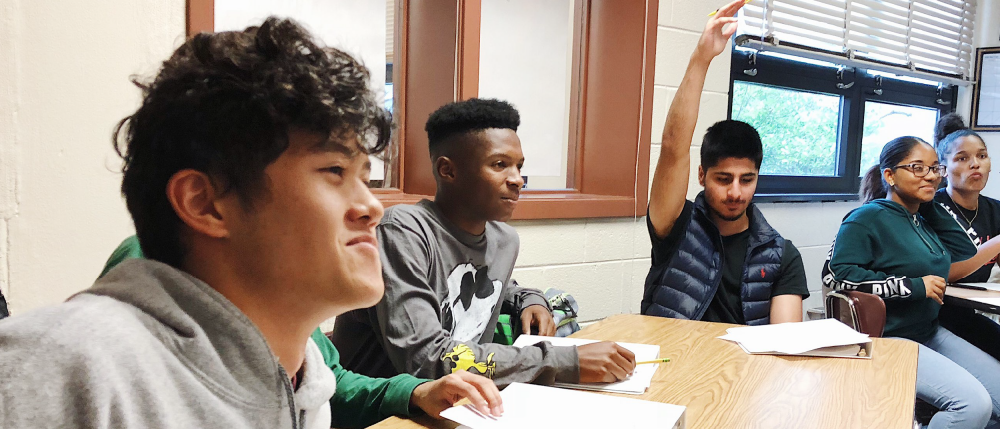

For too long, systemic barriers have created parallel divides in our city – one in digital access and another in career pathways. Just as the digital divide has limited technological opportunities in communities of color, discriminatory practices have historically restricted Detroiters’ access to career advancement by creating an “opportunity divide.” In 2024, our career education strategy was targeted at creating and expanding upon inclusive pathways to ensure Detroit’s next generation of talent can access the opportunities they deserve.
“We believe that investing in Detroit talent goes beyond just the financial component, and is enriched by curating relevant events, programs and partnerships that supports both our business and career seekers. This is one way that we look to highlight local partners and drive our shared hiring outcomes.” – Jonathan Pulley, Sr. Program Manager, Career Education, Rocket Community Fund
Strong partnerships are at the core of building opportunity, and we have the privilege to forge meaningful connections within our own organization to help us dismantle systemic barriers. Since 2023, we have partnered with the Rocket Talent Acquisition team to host Career Connections, bringing hundreds of local high school and college students to our Detroit headquarters for a day of learning and networking. While there, participants have the opportunity to tour and learn about our business, hear from leaders, and explore career opportunities within the family of companies. The goal of the Talent Acquisition team – to attract and retain diverse, top-tier talent – is aligned with our mission to create career and professional development opportunities for Detroit residents.

We frequently collaborate across teams, business areas and the larger Rocket organization to help us advance our shared mission. Since 2018, Rocket has been the anchor employer for Urban Alliance in Detroit, which offers paid internships at Rocket to Detroit high school students. UA interns explore careers, receive one-on-one mentoring, and learn essential skills to support them in their future career path. In 2024, we manifested the evolution of this internship model through a new partnership with Year Up. This innovative career accelerator provides tuition-free job training that precisely matches young professionals’ ambitions with high-demand internships in our organization. Once the program concludes, eligible interns are guaranteed permanent employment. All four Year Up interns placed with Rocket were offered full-time positions upon the conclusion of the program, and we are excited to grow our partnership – and opportunities for Detroiters – in the coming year!
“The partnership between Rocket Community Fund and Rocket Talent Acquisition is special because we have team members who care about helping Detroit talent reach their goals, while also supporting the city of Detroit and its growth. When you combine those two things, we have an immense opportunity to impact the outcome!” –DJ Bridges, Team Leader, Rocket Talent Acquisition
In 2024, we also expanded our support of the Detroit Area Talent Fund, which provides emergency financial aid to help college and post-secondary students stay on track when unexpected challenges threaten to derail their education. Together with the Last Mile Fund and the Detroit Regional Chamber, the Detroit Area Talent Fund launched in 2023 as a pilot program and supported nearly 1,300 students. This year, the program received additional support from new funders to help scale and expand the reach of the program, focusing specifically on students pursuing high-demand STEM majors and credentials. This aligns with our vision to support Detroit talent with pathways for careers in the rapidly expanding tech ecosystem and supports our mission to bridge the digital divide.
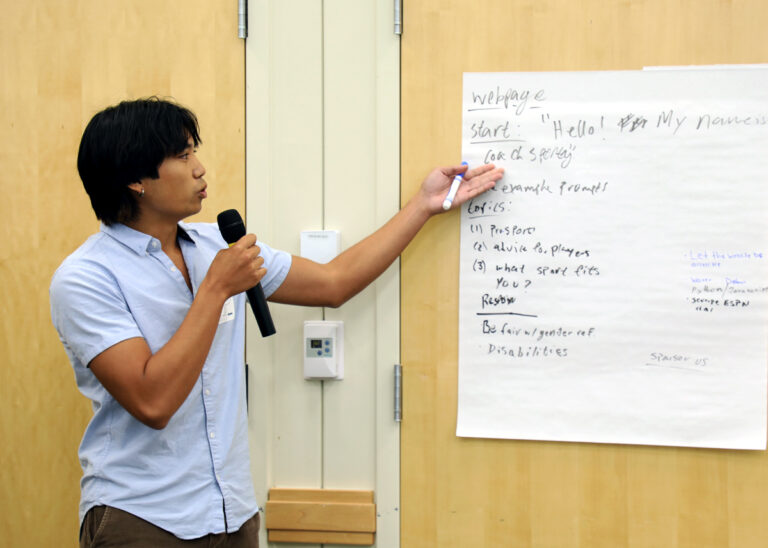
Another way we have “tied threads” with our digital inclusion work was through the Generative AI Immersion Day event we held in partnership with Grow Detroit’s Young Talent and Wayne State University. The event was a natural fit for an already robust partnership we have with GDYT that supports Detroit youth with internships, skill-building and career readiness training through the Tech On-Ramps program. The Generative AI event served as a celebration of our partnership and a platform for learning, where high school students from Detroit Public School District were hosted by WSU honor students and presented projects for a day of learning, networking and exploration.
2024 was a year of establishing strong foundations for the next phase of career education through strategic partnerships with local educational institutions, employers, and skill-building organizations. We’re proud to have planted the seeds for a sustainable ecosystem that doesn’t just prepare students for jobs, but ignites their potential to become the next generation of Detroit’s leaders and innovators.


2020 was a turning point for a core part of our mission focused on building opportunity for Detroiters. At the time, Detroit was the least connected city in the United States, a critical issue that was highlighted by the pandemic. What began with the Rocket Mortgage Classic’s Changing the Course initiative to bridge the digital divide has evolved into a comprehensive approach to digital equity that today positions Detroit as a national model for digital inclusion. Detroit’s digital transformation since 2020 exemplifies how strategic partnerships and community-driven initiatives can bridge the digital divide. Since 2020, Changing the Course has allocated $6M towards digital inclusion efforts.
“The Changing the Course initiative has had a transformational impact on Detroit over the past five years. Together, we have built a stronger foundation of digital inclusion by distributing more than 75,000 devices and connecting more than 150,000 families to low-cost internet options. Now we take the next step into digital empowerment to ensure more Detroit residents have the confidence and skills to leverage the digital world in every aspect of their lives. Our work has expanded beyond basic connectivity to encompass the full spectrum of digital empowerment.” — Laura Grannemann, Executive Director of Rocket Community Fund and Rocket Giving Fund board member
Of the $1.6M+ raised during the 2024 Rocket Mortgage Classic, nearly $600,000 was directed toward digital inclusion efforts as part of the “Changing the Course” initiative, benefitting Connect 313, and Human I-T, and the newest RMC beneficiary – Black Tech Saturdays, a nonprofit founded by Johnnie and Alexa Turnage to empower Black professionals and entrepreneurs in tech through skill development and community engagement.

Our partnership with Black Tech Saturdays reflects the evolution of our digital inclusion strategy. We understand that true digital equity requires more than just internet access—it demands comprehensive support for digital literacy, technical skills development, and access to essential digital tools and resources. Black Tech Saturdays exemplifies this need to build pathways that will empower Detroiters to fully participate in the digital economy. Our support of BTS catalyzed the first-ever Digital Empowerment Summit, a three-day, cross-location event with innovative workshops, keynote speakers from tech leaders and entrepreneurs, and the opportunity for local businesses to apply for grants supporting digital inclusion. Alongside BTS and Microsoft, we also hosted AI Explained, an immersive workshop and networking event open to Detroit entrepreneurs and the larger community, that aimed to demystify – and explore the unprecedented possibilities – behind AI.
“The goal is to build a robust ecosystem that supports community tech adoption and education not only in Detroit but across the nation. By attracting and retaining top talent, Detroit has the potential to become a leading hub for tech innovation, challenging traditional tech centers like Silicon Valley.” – Johnnie Turnage, Co-Founder and CEO, Black Tech Saturdays
Meanwhile, this year we continued to increase access to digital resources, devices and literacy by working collaboratively and celebrating milestones like the one-year anniversary of the opening of Human I-T on 7 Mile. This brick-and-mortar digital equity store is the first of its kind in the nation and has supported well thousands of Detroiters with low-cost, high-speed internet access, digital devices, tech support and training since opening in 2023.
Alongside the City of Detroit and other funders, we also celebrated the completion of a pilot project to install free Wi-Fi in five Detroit parks. Residents have access to free Wi-Fi at Bradby, Chandler, Clark, McDuffy and Palmer Parks which has transformed these thriving public spaces into digital access points, ensuring connectivity extends beyond home and work environments. And in the fall, Black Tech Saturdays hosted another AI immersion event in partnership with Grow Detroit’s Young Talent and Wayne State University, tying threads between our approach to digital inclusion and workforce development, preparing Detroit’s next generation of talent with the knowledge, training and mentorship to harness the power of our growing tech ecosystem.
Our digital inclusion progress demonstrates how strategic investment, community partnership, and innovative programming can create lasting change. As we continue to expand our digital equity work and refine our strategy, we remain committed to ensuring every Detroit resident has the digital resources and skills needed to thrive in today’s connected world.


Homeownership has long been a cornerstone of the American dream, offering a path to stability, wealth-building, and opportunity. Yet, too many families in Detroit and across the nation face barriers to achieving or maintaining stable housing, threatening their ability to achieve prosperity. At Rocket Community Fund, we’re working to close this gap. In 2024, we expanded our efforts to prevent displacement, reduce homelessness and increase access to affordable housing.
Rocket Community Fund firmly believes in making data-driven investments that are informed by the communities we serve. That’s why we developed our flagship community engagement program, Neighbor to Neighbor, which connects residents to critical resources while also collecting data to inform future investments. Though Neighbor to Neighbor began in Detroit, we have subsequently expanded the program to other markets including Cleveland, Atlanta and, for the first time in 2024, Milwaukee.
Over a four-month period, which included both door-to-door canvassing and an online survey campaign, our partners at United Way of Greater Milwaukee and Waukesha County and INPOWER connected Milwaukee households to resources focused on tax foreclosure prevention and eviction support. The findings of our work in Milwaukee were released in early 2025, providing critical insights to drive future investments.

In addition to launching our work in Milwaukee, we continued to deepen our investments in Atlanta and Cleveland with an eye toward protecting residents from displacement and creating alternate opportunities for homeownership. In Atlanta, we announced a combined $550,000 in two different programs. The first was a $250,000 grant for a pilot program with the City of Atlanta to cover the cost of property tax increases for qualified homeowners, and the second was a $300,000 investment with the Atlanta Volunteer Lawyers Foundation (AVLF) to strengthen their eviction defense services.
In Cleveland, we launched the Make It Home Cleveland program in partnership with Northeast Ohio Coalition for the Homeless, CHN Housing Partners and The Legal Aid Society of Cleveland. Modeled after the original Make It Home program in Detroit, the Cleveland pilot program aims to support approximately 50 households living in tax forfeited properties to purchase and repair their homes.
“Displacement negatively effects everyone – uprooting families while creating vacancy that drives blight and instability,” said Laura Grannemann, Executive Director, Rocket Community Fund. “Building on valuable lessons learned from running Make It Home in Detroit, we’ve developed a program tailored to Cleveland residents that disrupts this cycle by creating and supporting new homeowners.”
Speaking of Make It Home Detroit, Rocket Community Fund committed an additional $700,000 to the program, which provides a critical lifeline to renters at risk of displacement because their landlord didn’t pay property taxes. Instead of being displaced, the families in Make It Home get the option of purchasing the property through a 0% interest land contract for the cost of back taxes owed.
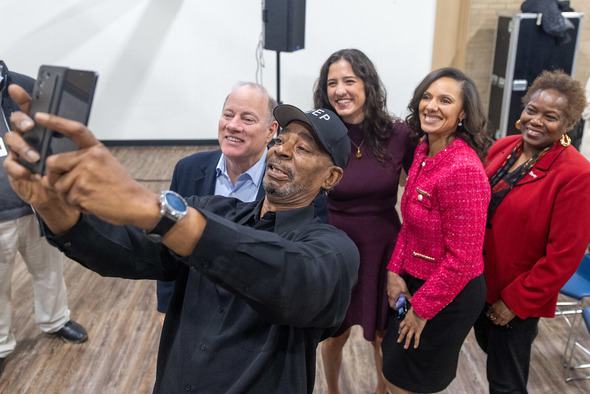
We joined Detroit Mayor Mike Duggan and the United Community Housing Coalition (UCHC) in November to announce the addition of 96 more Detroit families to the Make It Home program. With these new families, the Make It Home program has helped more than 1,600 Detroit families not only avoid eviction, but become the owner of their home since the program’s launch in 2017. We also contributed an additional $300,000 to support the associated Make It Home repair program, which has provided critical repairs to 566 homes since 2019.
In other homeownership news, Rocket Community Fund joined the second round of the City of Detroit’s Down Payment Assistance program, which helps make homeownership more accessible for Detroit residents. Saving for a down payment remains one of the biggest barriers to buying a home, especially for first-time buyers and families with limited financial resources. By providing financial support toward down payments, this program helps more Detroiters achieve the dream of homeownership. In the program’s first round, 434 total applications were approved, marking a promising step toward increasing homeownership rates and building generational wealth in the city.
Finally, Rocket Community Fund continued to support Built for Zero, a national movement of 148 communities focused on measurably and equitably ending homelessness. We have been a proud partner of Built for Zero, which is led by the national nonprofit Community Solutions, since 2018. Since joining the movement, our support has helped Built for Zero communities house more than 100,000 individuals, including more than 54,000 veterans. We are especially proud of the progress made by our home community of Detroit, where the collaborative efforts of the Detroit Continuum of Care have led to a 52% decrease in veteran homelessness since 2018.
Looking ahead, Rocket Community Fund remains focused on addressing the root causes of housing instability and advancing solutions that promote long-term affordability and homeownership. By listening to residents, partnering with local organizations, and investing in innovative programs, we are working toward a future where stable housing is within reach for every family, strengthening communities and creating lasting opportunities for generations to come.

After a temporary pause on door-to-door canvassing due to the COVID-19 pandemic, Rocket Community Fund returned to in-person canvassing for Neighbor to Neighbor in Detroit in 2023.
The program, conducted in collaboration with community organizations, Wayne County, and the City of Detroit, continued its efforts to address property tax delinquency and housing instability. The canvassing efforts targeted 60,000 households city-wide, connecting residents with resources such as the Homeowners Property Exemption (HOPE) program, legal assistance and eviction prevention services.
The Neighbor to Neighbor program has been hugely successful in Detroit, contributing to a 94% reduction in homes entering the Wayne County Tax Auction from 2015-2019. Insights gathered from phone canvassing in 2022 highlighted critical housing needs, including home repairs, homeowners’ insurance, and estate planning.
The program also supported a significant increase in HOPE applications, enabling residents to enroll in property tax exemption programs and access additional financial relief initiatives. Through Neighbor to Neighbor and associated programs, Rocket Community Fund and its partners achieved a milestone: more than 20,000 HOPE applications submitted!
At the end of 2023, Rocket Community Fund celebrated this success by holding a special party for our key housing partners. Check out the video of the fun and fulfilling event below.

Supporting students in their academic endeavors is pivotal for fostering individual success and community prosperity. Educational achievement serves as a cornerstone for personal growth and professional advancement, significantly impacting one’s ability to build wealth and secure a stable future. By investing in education, particularly for low-income individuals facing financial barriers, communities can break cycles of poverty and unlock opportunities for upward mobility.
Recognizing this, the Rocket Community Fund, in partnership with the Detroit Regional Chamber and Last Mile Education Fund, launched the Detroit Area Talent Fund (DATF) in 2023. The aim of DATF is to tackle one of the most pressing issues faced by low-income Detroit residents: unexpected financial hurdles that hinder their educational pursuits.
DATF provided emergency mini-grants of up to $599 per student annually to help cover various expenses that could otherwise jeopardize their academic advancement. From assistance with rent to covering childcare costs, the program acted as a crucial support system for students grappling with challenges beyond just tuition fees.
During its initial four-month pilot phase, the program received an overwhelming response, receiving 2,120 applications, of which more than half, 1,251, were approved. Notably, close to 850 of these successful applicants hailed from Detroit itself, underscoring the program’s impact within the city. A grand total of $700,766 in approved funding was disbursed, with the lion’s share going towards tuition and institutional expenses.
Moreover, the program shed light on the diverse spectrum of needs and backgrounds among Detroit’s aspiring scholars. Applications poured in from individuals pursuing various educational paths, including four-year degrees (64%), two-year degrees (27%), and other credential-based programs (8%). The applicant pool predominantly comprised Black individuals (71%), with substantial representation from other minority groups as well.
Through the provision of financial aid and ongoing support to students along their academic journeys, the Detroit Area Talent Fund is laying the groundwork for a brighter future for Detroit residents and was expanded in early 2024 with new partners. This initiative stands as a significant stride towards fostering a more equitable and prosperous Detroit.

As part of our commitment to building opportunity for Detroiters, Rocket Community Fund is proud to invest in a wide range of workforce development and career education programs.
One of our most successful partnerships is with Urban Alliance (UA), a nonprofit organization focused on supporting high school students in underserved communities with paid internships that prepare them for their careers. The Rocket Community Fund brought the flagship UA program to Detroit in 2018, and Rocket Companies serves as the anchor employer. Since then, 300 Detroit high school students have gone through the program, with over half interning at Rocket Companies. UA interns receive 1:1 mentoring as part of their internship, as well as on the job skills-training. They also learn career readiness skills, network, meet senior leaders and participate in contributing to their respective business areas.
In 2023, 25 Detroit high school students had internships at Rocket (with 5 students joining local nonprofit partners). We celebrated the graduating cohort at Detroit’s Garden Theatre, where UA and Rocket leadership reflected on the journey.
It’s a partnership that benefits both organizations, as a Rocket Companies internship opens doors to other opportunities which may otherwise have been inaccessible. In addition to learning valuable job skills, Rocket Companies is able to leverage the fresh perspectives and new ideas of Detroit’s best young talent. The efforts are paying off!
Several UA interns have gone on to full-time employment at Rocket Companies after college, with many others finding roles at leading companies in the city. For many interns and their mentors, the UA Rocket internship experience has proven to be a life-changing experience. Take a look at what these interns had to say about their internships
We are dedicated to expanding career opportunities for Detroit talent, and we look forward to seeing this partnership with Urban Alliance – and the futures of the participating interns – expand and evolve for years to come.
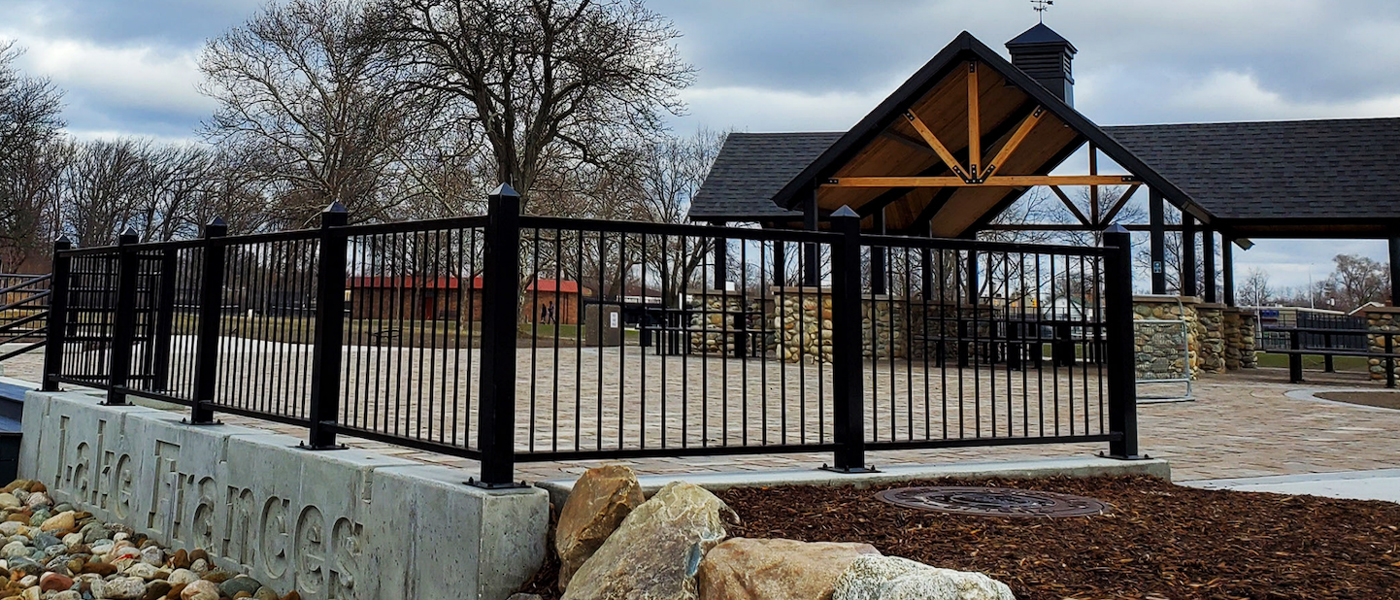
In 2023, Rocket Community Fund played a pivotal role in a collaborative effort to bring free public Wi-Fi to Detroit residents. The initiative, which included the Detroit Parks Coalition, Connect 313, the City of Detroit, and other funders, aimed to show how we could bridge the digital divide and enhance quality of life for Detroiters by adding Wi-Fi to public parks.
The pilot program installed free Wi-Fi networks in five Detroit parks: Bradby, Chandler, Clark, McDuffy, and Palmer. Because parks are already community hubs, it was only logical to integrate technology in a way that would serve residents and enrich the park experience. Visitors can access information about the surrounding nature, stream music, or connect with loved ones – all while enjoying the outdoors.
The Park Wi-Fi initiative was a project of Connect 313, a collaborative established to coordinate and support city-wide digital inclusion efforts with a data-driven, community-based philosophy. Connect 313 was first established at the 2020 Rocket Mortgage Classic, a fact that Rocket Community Fund Executive Director Laura Grannemann noted at the announcement of Park Wi-Fi project.
“It is fitting that Palmer Park, the home of the Rocket Mortgage Classic where Connect 313 was first established in 2020, is the first park to install this vital technology,” said Grannemann. “Increasing access to Wi-Fi in public spaces like these five parks is a major part of the path forward to a more connected and equitable city.”
The Park Wi-Fi project is a great example of the success of Detroit’s collaborative approach to bridging the digital divide. By working together, Detroit has gone from being the least digitally connected city in the country in 2019 to a model of what is possible for cities nationwide.

Our partners at Human I-T recognize that digital access is necessary to building a successful future. Their mission is to empower people with the devices and training they need to access digital resources, which ties directly into our efforts to bridge the digital divide. We know that a stable home is a connected home. That’s why since 2020, we have collaborated on a shared vision to create digital access for Detroiters, including contributing significant capital to help Human I-T open their first warehouse in Detroit. In 2023, we reached another milestone together when Human I-T opened their first digital equity store, Human I-T on Seven Mile.
This new, affordable electronics retailer is the first brick-and mortar-store of its kind in the nation, and it’s located right in Detroit’s historic fashion district. The Human I-T retail space provides onsite services and support to the community including affordable technology and low-cost internet, as well as digital skills training, digital devices and tech support for residents who need it.
Digital equity might be a tall order, but we are willing to fight for Detroiters to have access to these critical resources. WWE superstar Omos felt the same way, which is why he came to Human I-T on 7 Mile earlier in the year to help distribute digital devices to some very happy Detroit fans.
Omos’ appearance was part of a broader campaign with WWE thanks to Rocket Mortgage’s sponsorship of Summer Slam. To make the event even more thrilling, Rocket Mortgage agreed to make a donation every time a WWE superstar made a move from the top rope! In total, Rocket Mortgage donated an additional $125,000 to Connect 313 as part of the high-flying promotion.
Thanks to continued collaborative efforts like this, our goal to bridge the digital divide is working: In 2019, Detroit was the least connected city in the United States at 40% digitally included. Today, that number has jumped to over 70%, and we look forward to seeing how this unique retail space will continue to support residents with the digital resources they need to thrive.

In 2023, Rocket Community Fund celebrated the continued success of the Make It Home program alongside our partners, the City of Detroit and the United Community Housing Coalition (UCHC). The program achieved a significant milestone, helping 104 Detroit families become homeowners, bringing the total number of participants who avoided eviction due to tax foreclosure to 1,500 since the program’s inception in 2017.
Make It Home offers a lifeline to Detroiters residing in tax-foreclosed houses. The program leverages the City’s “right of refusal” to purchase these properties before they go to auction. These homes are then acquired by UCHC with philanthropic funding from Rocket Community Fund. Residents can then purchase their homes through a 0% interest land contract with a payment plan for the back taxes owed, typically paying around $8,400 on average in total for the home. Upon completing the program, participants not only gain ownership of their homes but also receive access to valuable resources like home repair grants, loans, and financial counseling.
Rocket Community Fund recognizes that homeownership is a journey, not just a destination. In 2023, we made a significant commitment to expanding the program’s impact by allocating an additional $1 million in funding. This includes $750,000 specifically dedicated to home repair support, ensuring participants can address critical maintenance needs and create safe, healthy living environments for their families.
The Make It Home program has garnered strong support from Detroit’s leadership. At an event celebrating the new group of homeowners, Mayor Mike Duggan emphasized the program’s role in strengthening neighborhoods, building generational wealth, and fostering stability for families.
Demetrius Brown, a 57-year-old lifelong resident of Detroit who participated in the program, described Make It Home as a “long-awaited sigh of relief.“
“[Make It Home] means that I can maintain this home, providing my three daughters with the chance to grow up in a stable and nurturing environment,” said Brown. “We’ll continue to create cherished memories here, and I couldn’t be more thankful for that.”
The Rocket Community Fund remains firmly committed to supporting the Make It Home program alongside UCHC and the City of Detroit. By working collaboratively, we can ensure more Detroiters achieve the dream of homeownership, contributing to a stronger, more vibrant city.

Rocket Community Fund made a significant contribution to Milwaukee’s housing stability efforts in 2023 with a $300,000 investment in MKE United’s Anti-Displacement Fund program. This program safeguards homeowners in downtown-adjacent neighborhoods facing potential displacement due to rising property taxes.
Established in 2019, the Anti-Displacement Fund is a five-year pilot program designed to address rising property values near downtown Milwaukee. These increases threaten to displace long-time residents, especially seniors and others on fixed-incomes, who can no longer afford the tax burden. Our investment, the program’s largest single contribution to date, strengthens these neighborhoods and empowers residents to remain in their homes.
Since its launch in 2020, the Anti-Displacement Fund has demonstrably improved housing stability. In its first year, the program disbursed nearly $39,000 in tax assistance payments, increasing to over $91,000 in 2021. Most importantly, no program participant has been forced to sell their home due to property tax burdens.
Our commitment to the Anti-Displacement Fund was aligned with the City of Milwaukee’s broaden Anti-Displacement Plan and deepens our connection to Milwaukee’s evolving housing market. In 2022, Rocket Community Fund collaborated with the Reclaiming Our Neighborhoods Coalition to evaluate housing conditions across 15 Milwaukee neighborhoods.
By safeguarding residents from displacement, the Anti-Displacement Fund fosters stable, thriving neighborhoods and empowers residents to remain a part of the vibrant tapestry of Milwaukee.
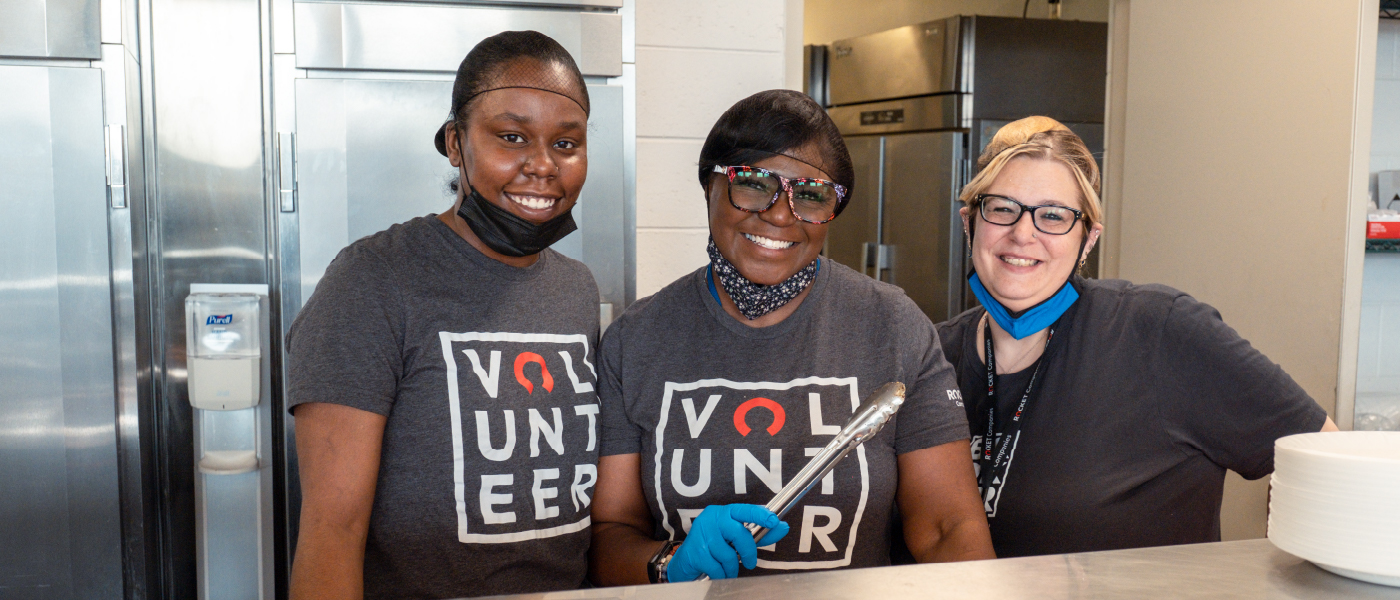
Rocket Companies team members are deeply committed to the communities we serve. Our Volunteer Engagement and Giving team works tirelessly to ensure that we’re providing our team members with meaningful volunteering and fundraising experiences that resonate with them, which is why we partner with hundreds of nonprofits across the country.
All our team members are devoted to making an impact, which is in large part why we reached $1M volunteer hours in 2023, and we were also listed as #2 on People Magazine’s list of 100 Companies That Care. But some of our team members go above and beyond with their dedication to serving the community. We are inspired by so many of their stories of how they contributed in 2023 – read on to learn more.
Rocket Companies team member Rumana Rahman is one of our most dedicated volunteers. She also loved to garden, and bring different communities together. Rumana united these passions and in partnership with Community Development Organization One New Humanity, in 2022 she started her own urban community garden in Hammtramck, called Sylhet Farms. To raise awareness and funds for the rapidly growing community garden, Rumana nominated Sylhet Farms to participate the Rocket Companies Community Challenge – and the organization was accepted as a nonprofit “Challenger” participating in 2022 and 2023.

As a grassroots nonprofit, Sylhet Farms was the ideal organization to be part of the Challenge, and for the past two years, Rumana’s teammates have been enthusiastic supporters and fundraisers, and Rumana was able to organize many group volunteer events at Sylhet Farms as a result. Several of her teammates even offered their unique skillsets to make the garden more accessible! The Community Challenge was instrumental in spreading awareness about Rumana’s nonprofit, and enabled Sylhet Farms to win bonus challenges during the fundraising campaign. Sylhet Farms continues to be a popular outdoor volunteer event – founded and driven by one very passionate Rocket Companies team member.
Paul Minor started volunteering with Big Brothers Big Sisters (BBBS) of America through a special partnership with BBBS called Beyond School Walls, where “Littles” enrolled in the program would visit the Charlotte office to be mentored by team members and leaders – leaders like Paul. He became so invested in the program that Paul soon became an official ambassador of BBBS and has mentored two of his “Littles” through the entirety of their middle school years. For Paul, the ongoing experience has been transformative – both for him and for the youth he mentors.

Kim Lehman – who is based in Detroit – also became an unofficial ambassador for the nonprofit Free Bikes 4 Kidz (FB4K), an organization that cleans, refurbishes and also donates new bikes to children. Kim has gone above and beyond to support FB4K, storing dozens of bikes at her (and her neighbors!) homes, and encouraging her friends, families and teammates to donate bikes or volunteer at the organization. Kim also switches between nonprofits during different seasons, supporting animal rescues, food security efforts, and more. She frequently rallies her team, providing her teammates with a fun opportunity to connect while supporting the community through a meaningful cause.
When our team members put their passion for helping their communities into action, they are bringing about real positive change. We are proud to provide them with the opportunities to support these and other organizations that are building a more resilient and stable world.

One of the many ways we support Rocket Companies team members is by providing them with curated experiences and opportunities to make an impact in their communities. As our most ardent community advocates, we are hyper-focused on ensuring we harness the passions of our team members to create positive change. That’s why the Rocket Companies Community Challenge is such a beloved and important part of team member-led social impact.
This annual crowdfunding campaign gives team members the opportunity to nominate, advocate, and fundraise for the nonprofits they care about most. It’s also a chance for team members to get their friends, families and connections involved, and has the added benefit of providing exposure to smaller, grassroots nonprofits across the nation. Each year, team members nominate hundreds of organizations, and once the Challenge begins, they help us raise several hundred thousand dollars in a manner of weeks. In 2023, Rocket Companies team members helped us raise over $1.36M for the 184 nonprofits participating in the Community Challenge.
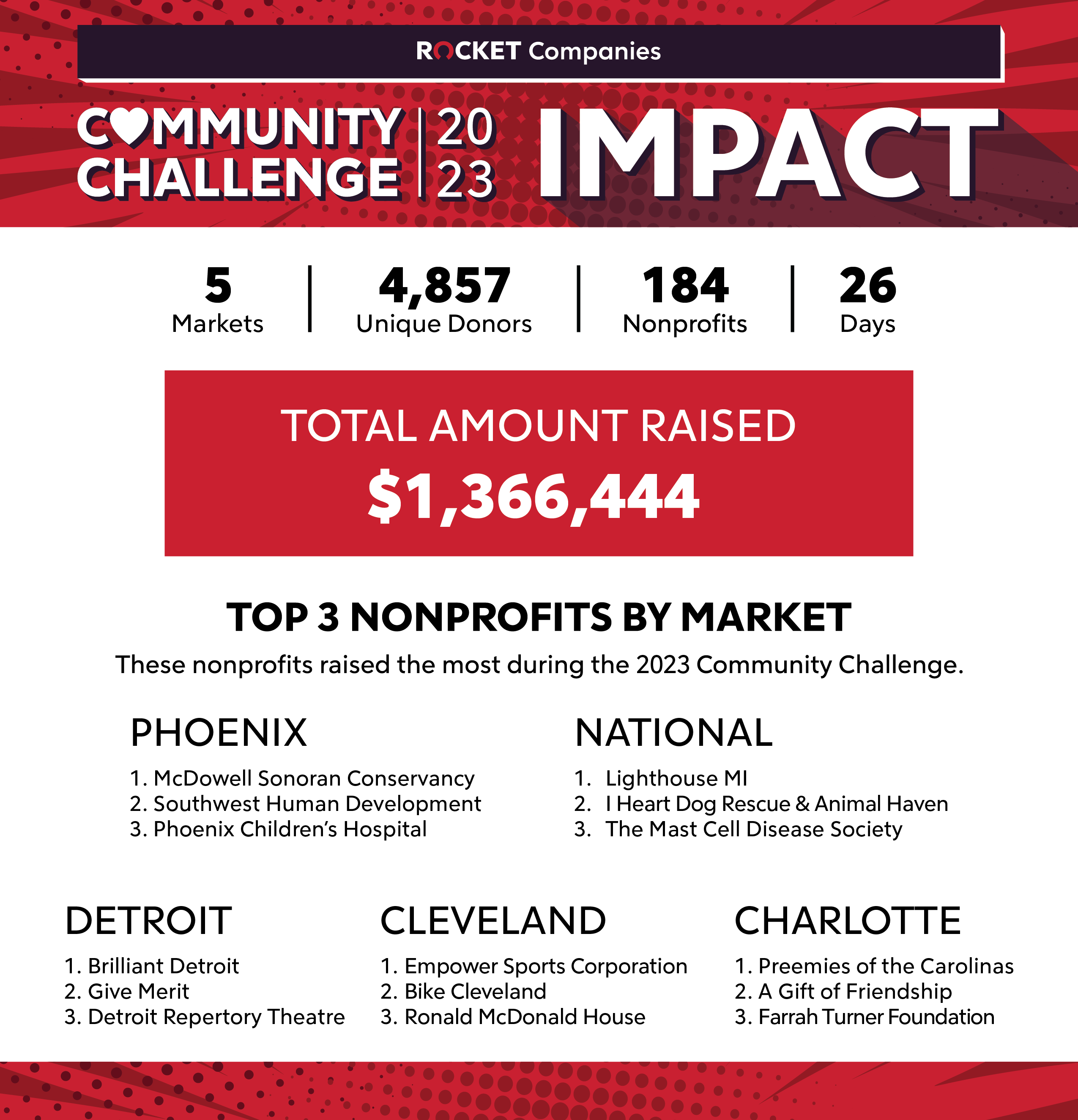
Since we began the Community Challenge in 2016, we have raised over $9.4M dollars for nonprofits focused on causes that our team members support. This is our biggest annual fundraiser, and it is driven almost entirely by team members. Their impact speaks volumes about how they care for our communities, and we are proud to see how the Community Challenge continues to serve as an important vehicle for good.
Watch the video to learn more about the Community Challenge.

The Rocket Community Fund is dedicated to creating access to opportunity for residents, which includes creating pathways to economic mobility through career advancement. As part of our joint $500M commitment with Gilbert Family Foundation to support Detroit neighborhoods, we want Detroiters from all walks of life to know that they have a place at Rocket Companies. Our Education and Employment team regularly partners with the Rocket Central Talent Acquisition team to provide Detroiters with a variety of career development and workforce training opportunities.
In 2023, we launched our first two Career Connections events, a partnership with the shared vision to attract and retain local, diverse, top-tier talent. The main goal of Career Connections was to introduce Detroit and Michigan-based talent to career opportunities at Rocket Companies, while giving job seekers insight into what it’s like to work at Rocket, while highlighting the multifaceted nature of our business. At each event, hundreds of high school and college students had the chance to network, hear from senior leaders, tour the business and learn about the many career paths available across our organization.
Check out video recaps of both exciting events below!

We often say that Rocket Companies team members are our biggest community advocates, and their passion for making a positive difference in the communities we serve is evident in the way they show up to volunteer and fundraise. Our Volunteer Engagement and Giving team works to ensure that every team member can make an impact in a way that is meaningful to them, which is why we offer such a wide variety of volunteer experiences and team member-driven fundraising opportunities.
These collective efforts enabled us to reach a very big milestone in summer 2023: 1 million volunteer hours from Rocket Companies team members nationwide. In the past decade, team members have participated in more than 150,000 volunteer events with over 4,000 nonprofit organizations across the country. As of June 2023, 27,096 Detroit team members had participated in 126,407 volunteer events! As we continue to scale and our markets grow, so will these numbers.
To celebrate reaching 1 million volunteer hours, we surprised the volunteers who were participating in an event with Greening of Detroit that got us to that millionth hour milestone – and we also surprised our Detroit team members with a big celebration featuring fun activations, food, drinks and swag! Take a look to learn more about the event, our impact and how team members feel about working for an organization dedicated to serving the community.
Together, we’re confident that we can reach 2 million volunteer hours in record time!

In an increasingly digital world, access to technology, high speed internet and digital skills training has become essential to ensure equal opportunities for all individuals. From education and employment to healthcare and civic engagement, those who have access to digital resources consistently outperform their less connected peers. These disparities have real consequences and are especially common in underserved communities.
As part of our comprehensive approach to community investment, Rocket Community Fund expanded its significant housing investments with the Atlanta BeltLine Partnership (ABP) to also include support for their digital inclusion efforts. Specifically, Rocket Community Fund provided funding in August 2023 to support the development of ABP’s digital inclusion strategy.
This innovative collaboration marked ABP’s entry into smart city initiatives, leveraging technology to address critical urban challenges while ensuring equitable access to digital resources for all residents.
The initiative acknowledges the significant digital divide within Atlanta, with some BeltLine neighborhoods experiencing limited access to high-speed internet (25-33%). To address this gap, the project sought provide free public Wi-Fi along the BeltLine corridor.
Other partners in the effort included Honeywell, a global leader in smart city solutions, and N-Ovate, a metro Atlanta innovation firm, which spearheaded strategy development. Their work involved data collection and analysis to identify the most effective technologies to bridge the digital divide and address local challenges.
Rocket Community Fund’s support for the digital inclusion investments complements our investment in ABP’s Legacy Resident Retention Program (LRRP). Many of the residents who are eligible for the LRRP also have limited access to technology, so this investment is helping ensure that they too will benefit from the myriad enhancements along the BeltLine.
The Atlanta BeltLine’s digital inclusion initiative, supported by the Rocket Community Fund, represents a significant step towards a more connected, equitable, and sustainable future for Atlanta residents.

For seniors, the safety and accessibility of their homes are paramount to their overall quality of life. Aging often brings physical limitations, making the need for a safe living environment crucial. Home repairs not only ensure the physical safety of seniors but also contribute to their emotional well-being by allowing them to age in place with dignity and independence. Unfortunately, many residents cannot afford to make these necessary repairs.
Rocket Community Fund recognizes that low-income homeowners, especially seniors on fixed incomes, need help accessing quality home repair services so we made multiple investments in both Atlanta and Detroit focused on this important issue.
In Atlanta, Rocket Community Fund partnered with HouseProud Atlanta Inc. to support critical home repairs for senior citizens in District 4. Our investment of $100,000 built upon an earlier $50,000 donation from Council Member Jason S. Dozier, whom we worked with to coordinate the resources.
Rocket Community Fund’s investment was based, in part, on insights gained through Neighbor to Neighbor canvassing, which sought to connect Atlanta residents with crucial housing resources. Through community outreach, a significant gap in home repair assistance was identified, and this investment is one of several efforts designed to bridge the gap.
HouseProud Atlanta was an excellent partner in this effort and provides a wide range of essential home repair services for low-income seniors, veterans, and disabled homeowners. From painting and electrical repairs to heating and cooling upgrades, HouseProud ensures that these residents can maintain safe and comfortable homes.
In addition to our investment in Atlanta home repair, Rocket Community Fund made a significant new contribution to its existing Make It Home repair program. Founded in 2019, the Make It Home repair program connects residents in Make It Home (a program that turns vulnerable renters and other non-deedholders into homeowners) with access to critical home repair funding.
We learned quickly that many renters in Make It Home were facing deferred maintenance from former owners and developed the repair program in response. Through grants and low-interest loans funded by the Rocket Community Fund and administered by United Community Housing Coalition (UCHC), Make It Home participants can address repairs focused on health and habitability.
Since its inception in 2019, 566 homes have benefited from Make It Home-associated repair resources. This year, the Rocket Community Fund committed an additional $750,000 to the program, bringing its total support for repair funding to $3 million. By investing in home repair, Rocket Community Fund is making a tangible difference in the lives of residents across the country, ensuring they can remain in their homes and fostering a stronger and more vibrant community.

In 2020, the Rocket Mortgage Classic PGA TOUR event and title sponsor Rocket Mortgage® made the strategic decision to address the digital divide in Detroit by launching its multiyear Changing the Course initiative. Changing the Course was created to raise awareness of the digital divide and support transformational efforts to ensure all residents of the community received access to the digital resources they deserve.
The first year of the Changing the Course initiative proved monumental by providing the necessary funding to launch Connect 313, a partnership between the Rocket Mortgage Classic, the Rocket Community Fund, City of Detroit and Microsoft, that collaborates on a citywide, data-driven digital inclusion strategy. Since that time, through the efforts of Connect 313 and affiliated partners, Detroit has gone from being 40% to 70% digitally included.
In December 2023, the Rocket Mortgage Classic announced a contribution of $1.61 million to support local Detroit nonprofits from the 2023 tournament. Connect 313 received $581,400 from the proceeds. Since 2019, the Rocket Mortgage Classic has invested over $8.4 million in local charitable organizations, with $4.3 million supporting the Changing the Course initiative.
Through the efforts of Connect 313 and affiliated partners, Detroit has been able to maximize opportunities to connect its residents. Specifically, Detroit led the nation in signups for the Affordable Connectivity Program (ACP), a federal program that provides a one-time $100 discount on digital devices and an ongoing discount of $30 per month for high-speed internet service. Though the ACP stopped accepting new applications in February 2024, the Detroit community is continuing to work to connect residents through alternative means.
In addition to the continued impact of the Rocket Mortgage Classic, the Detroit Lions and Rocket Mortgage collaborated on an exciting partnership to bridge the digital divide by donating $313 for every defensive stop on third down during the season. By the end of an incredible Detroit Lions season, which saw the team go to the playoffs and win their first postseason game in 32 years, the Detroit Lions donated $50,000 to Connect 313.
Both the Rocket Mortgage Classic and Detroit Lions partnerships are perfect examples of how Rocket Companies thinks creatively about how all aspects of its business can make a positive impact in the community.

Rocket Community Fund firmly believes in making data-driven investments that are informed by the communities we serve. That’s why we developed our flagship community engagement program, Neighbor to Neighbor, which goes door-to-door connecting residents to critical resources while also collecting data to inform future investments. Though Neighbor to Neighbor began in Detroit with a focus on tax foreclosure prevention and reform, we have since expanded the program to Cleveland and, in 2023, to Atlanta.
Our entry to the Atlanta market was a collaboration with Partnership for Southern Equity (PSE) and Atlanta BeltLine Partnership (ABP). Together, we set out to reach 20,000 households across 20 Atlanta neighborhoods over four months with the goal of connecting residents to resources aimed at preventing displacement while also increasing livability. These resources included property tax assistance, down payment or closing cost assistance, legal representation to avoid displacement, and more.
Additional CDC partners for Neighbor to Neighbor Atlanta included Summech Community Development Corporation, Historic District Development Corporation and Grove Park Foundation.
Atlanta Mayor Andre Dickens attended the kickoff for Neighbor to Neighbor and shared his excitement for the program, saying “Our vision of ‘one city with one bright future’ can only be achieved through collaborative partnerships that prioritize our most critical needs, like stable and secure housing. Neighbor to Neighbor will invest in communities across Atlanta, and I am grateful to the Rocket Community Fund, Atlanta BeltLine Partnership and Partnership for Southern Equity for their commitment to fostering the equity and economic inclusion of Atlantans.”
Mayor Dickens’ enthusiasm was shared by the canvassers hired for Neighbor to Neighbor, who were excited at the opportunity to connect residents in need to critical services and support.
Rocket Community Fund evaluated findings from Neighbor to Neighbor Atlanta in early 2024 and released a report summarizing our findings.
Rocket Community Fund launched a major effort to protect Cleveland renters in 2023 with the establishment of the Cleveland Eviction Defense Fund, through a $1.25 million investment with the Legal Aid Society of Cleveland. The Cleveland Eviction Defense Fund initiative combats housing displacement by providing legal representation, advocacy, and emergency rental assistance to low-income residents facing eviction.
Building upon the success of the Cleveland’s existing “Right to Counsel” program, the fund ensures more residents have access to crucial legal resources during eviction proceedings.
Rocket Community Fund’s commitment extends beyond legal aid support. Through collaboration with the City of Cleveland and Cuyahoga County, we are also seeking long-term funding solutions to ensure the continued sustainability of the program. The Cleveland Eviction Defense Fund also strengthens the Legal Aid Society’s ability to expand its referral partner network and ensure residents can connect to other critical programs, such as emergency rental assistance through CHN Housing Partners.
CHN’s Housing Navigators will aid tenants in finding affordable housing, while supporting landlords in utilizing assistance tools. The Navigators will assist tenants with applications, financial aid and lease comprehension. CHN plans to fund security deposits and three months’ rent when needed.
Rocket Community Fund’s annual Neighbor to Neighbor campaign data played a crucial role in informing the development of Cleveland Eviction Defense Fund. In the 2023 Neighbor to Neighbor report, based on 2022 canvassing, we learned a significant portion of residents (19%) were struggling with rent payments, underscoring the need for eviction prevention measures.
Through the Cleveland Eviction Defense Fund, we are fostering a more comprehensive approach to housing stability. By offering legal support, financial assistance, and access to additional resources, the fund empowers Cleveland residents to maintain secure housing and build a stronger foundation for their lives.
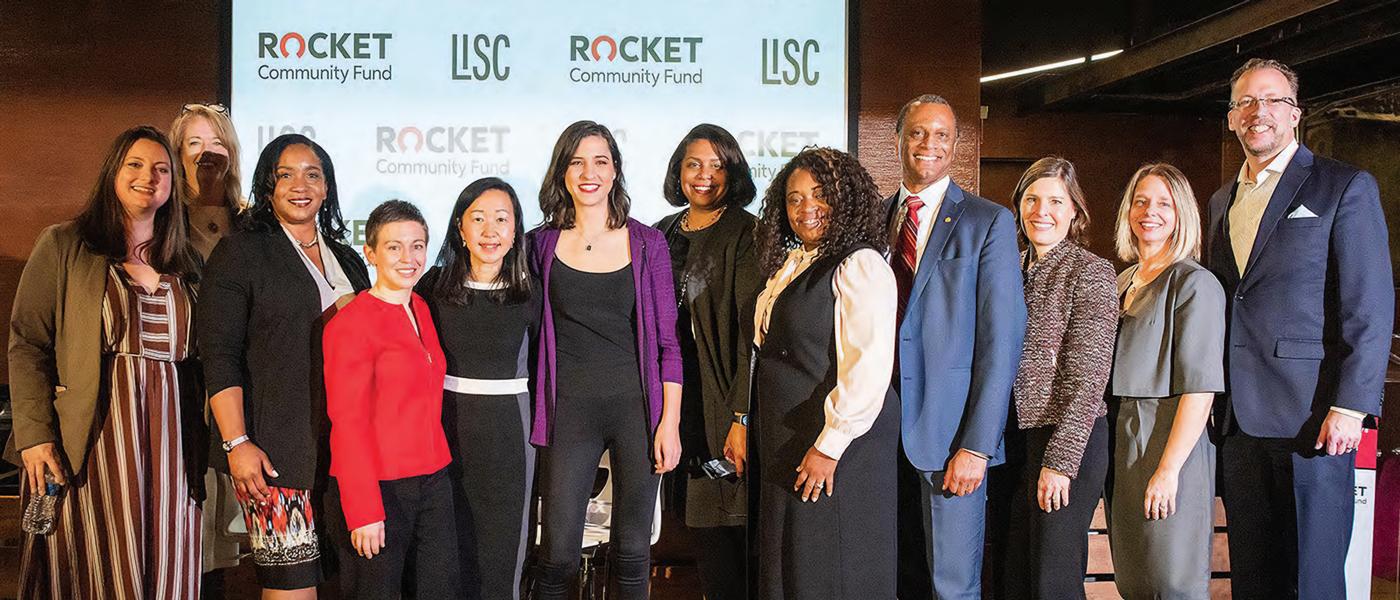
In late 2022, Rocket Community Fund, in collaboration with Local Initiatives Support Corporation (LISC), launched the Rocket Wealth Accelerator Program. This $2 million initiative was designed to promote financial stability for underserved residents in Detroit, Cleveland, Milwaukee, and Atlanta. Through the program, clients are connected to coaches at designated LISC Financial Opportunity Centers for assistance with enhancing their emergency fund management, building credit and taking the necessary steps to accumulate generational wealth.
Additionally, the Rocket Wealth Accelerator provides matching funds for participants’ savings plans, offering up to $500 for those with long-term goals like purchasing a home or vehicle, and up to $300 for those with short-term or emergency savings needs. Participants also received an optional three-month subscription to Rocket Money, a service that helps manage subscriptions, lower bills, and build budgets, providing insights into their financial situation.
Throughout 2023, more than 1,700 clients engaged with financial coaching at LISC’s Financial Opportunity Centers, where they built an action plan and completed a budget assessment. Upon successful completion of these items, the clients become eligible for matched savings through Rocket Wealth Accelerator.
In total, 785 individuals created a budget through the program, 394 developed a secondary budget, 363 increased their earnings, and 316 increased their savings by an average of more than $1,000.
LISC estimated that Rocket Wealth Accelerator accounts will result in a projected $129,000 personal savings generated for participants, with $64,600 coming from Rocket Community Fund through matched savings.
Beyond the numbers, the impact of the Rocket Wealth Accelerator program is best seen in the confidence and renewed optimism of its participants. Like Romell Johnson from Detroit, who shared that participating in the Rocket Wealth Accelerator made him feel “unstoppable.”
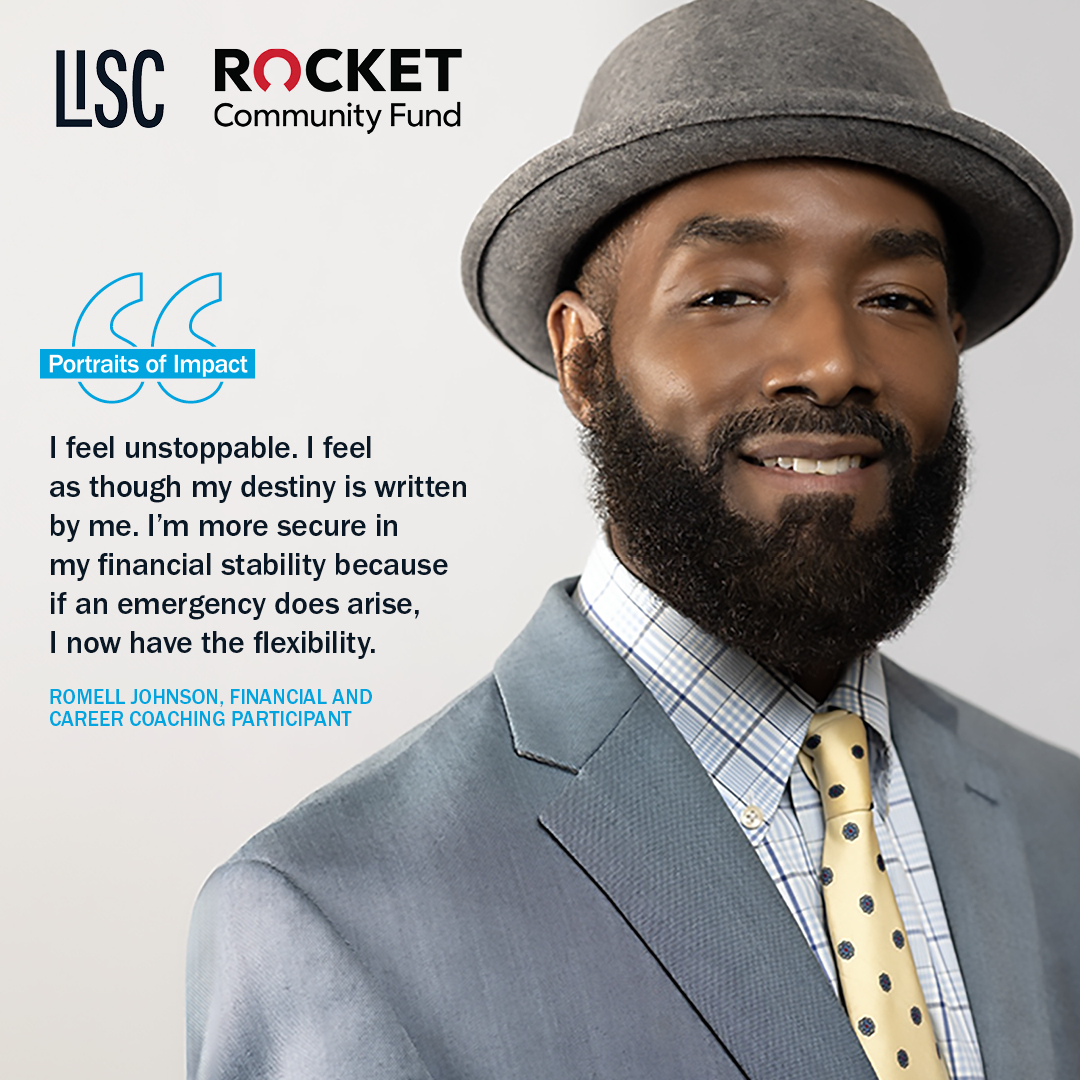
We are thrilled to continue working with LISC on this impactful program and finding ways to help residents in Detroit, Milwaukee, Atlanta and Cleveland build long-term wealth.

In addition to our ongoing support for Built for Zero, Rocket Community Fund has played a crucial role in addressing homelessness by investing in innovative solutions like medical respite housing.
Nationwide, people experiencing homelessness have five times the risk of hospitalization as those with stable housing. While the ultimate goal of ending homelessness is always to move individuals into permanent housing, the complexity of homelessness necessitates housing interventions across a wide spectrum of need. For individuals who are both experiencing homelessness and recovering from a medical issue, respite housing is one valuable solution.
In 2023, Rocket Community Fund joined Neighborhood Service Organization (NSO) in celebrating the opening of a medical respite program, situated in the Detroit Healthy Housing Center on the city’s east side. The Detroit Healthy Housing Center will serve 165 individuals annually with an average length of stay of 30 days and is projected to generate $1.2 million in healthcare savings annually through stable housing and reduced hospital visits.
Rocket Community Fund’s support focused on the medical respite aspect of the program, which provides 17 beds for homeless individuals to receive continuing care post-hospitalization. Individuals will also be supported with social services focused on getting them into more permanent housing.
By addressing the disproportionate risk of hospitalization among people experiencing homelessness, this program plays a vital role in achieving better health outcomes and enhancing overall community well-being. As Rocket Community Fund Executive Director Laura Grannemann explained at the groundbreaking ceremony for the complex in 2021, “Safe and stable housing is one of the strongest determinants of health, and that is never truer than when someone is recovering from a health challenge. Combating homelessness requires collaboration and an all-of-the-above strategy, and we are proud to support NSO as they launch a new and innovative medical respite facility.”Success Stories From Built for Zero
In 2023, Rocket Community Fund also celebrated the groundbreaking for the Benjamin O. Davis Veterans Village, which will provide critical affordable housing and supportive services for veterans experiencing homelessness and residents with disabilities in Detroit. Rocket Community Fund had previously provided $300,000 in predevelopment funding for the project, allowing it to raise funds for construction.
The development of the Benjamin O. Davis Veteran’s Village was a true collaboration, involving a wide range of stakeholders including MSHDA, the City of Detroit, the Detroit Housing Commission, Local Initiatives Support Corporation (LISC), RAD Conversion Specialists LLC, Communities of Hope and Central City Health.
In total, Benjamin O. Davis Veterans Village will feature 50 one-bedroom apartments, half of which will be used as permanent supportive housing for people experiencing chronic homelessness, with a specific focus on assisting veterans.
Through initiatives like Built for Zero and strategic investments in innovative housing models, Rocket Community Fund is helping communities like Detroit make significant progress in their mission to end homelessness and provide stable, supportive housing for all.
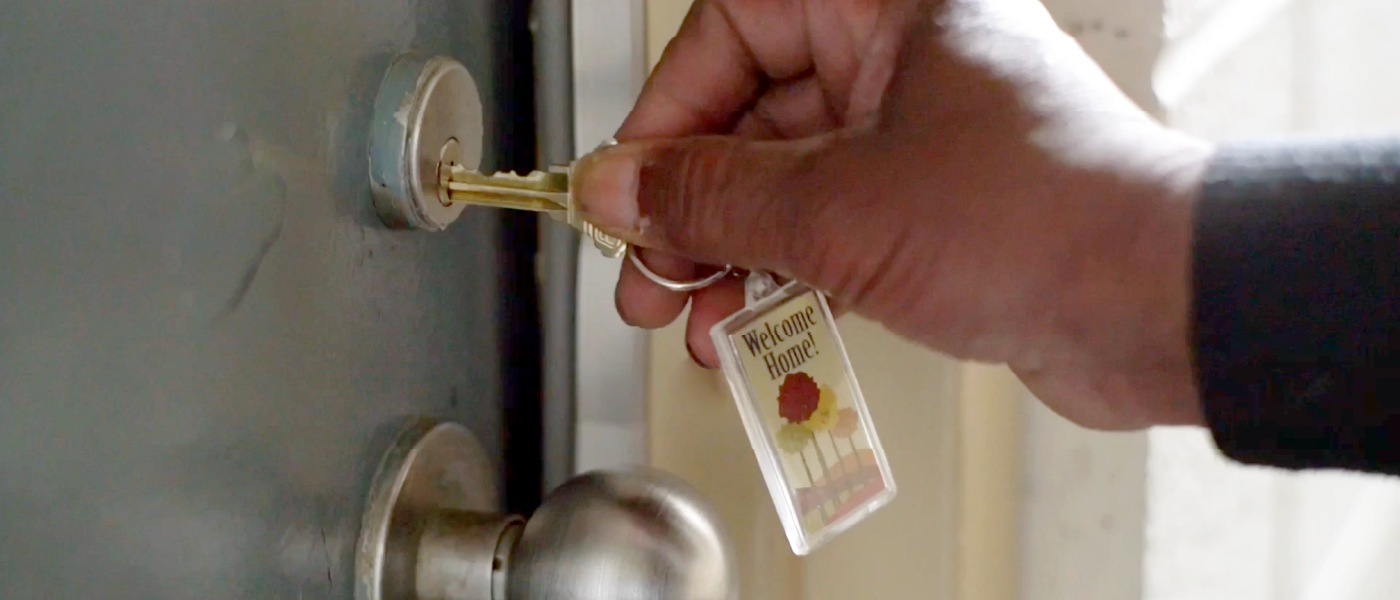
According to the U.S. Department of Housing and Urban Development (HUD), the number of people experiencing homelessness increased by 12 percent, or roughly 70,650 more people, between 2022 and 2023. Like other housing issues, the challenge of homelessness also reflects the dangerous consequences of inequitable and racist systems with HUD data showing that Black, Indigenous and People of Color (BIPOC) groups continue to be overrepresented among the population experiencing homelessness.
Rocket Communinty Fund is proud to support efforts to measurably and equitably end homelessness as a lead partner of the Built for Zero movement, an initiative aimed at reducing and ultimately ending homelessness in our communities. This collaborative effort, led by the nonprofit Community Solutions, brings diverse community stakeholders together to rebuild their homelessness response systems with evidence-based strategies that drive measurable outcomes.
Several communities have made significant strides in their efforts to combat homelessness. Highlights from Built for Zero in 2023 include:
One of the communities that has seen the most success through Built for Zero is our hometown of Detroit, where remarkable progress has been made in reducing veteran homelessness. Over the past three years, Detroit has seen a nearly 50% decrease in homelessness among veterans, which is significantly higher than the national average of 11% over the same period of time.
Spearheaded by a collaborative of partners including the VA, Detroit VA Medical Center, Volunteers of America Michigan, and many others, Detroit is on track to achieve functional zero, indicating rare and brief homelessness for veterans. This amazing progress represents a model for other large cities to aspire toward.
”When I began to more deeply understand the progress Detroit has made, I literally got chills,” said Kally Canfield, System Improvement Advisor for Community Solutions. “They are in a place now that I have literally dreamed about being in other large cities that I’ve worked with. If the city can continue on its current trajectory, we believe Detroit will be among the first large cities in the country to achieve functional zero for solving veteran homelessness.”
Rocket Community Fund is eager to support Detroit’s continued progress through our partnership with Built for Zero and strategic direct investments in housing interventions, such as our previous support for the conversion of 211 Glendale a transitional housing complex that now provides permanent supportive housing for veterans.

March is National Reading Month, and we wanted to celebrate with a unique volunteering and fundraising opportunity. In 2022, we hosted our first virtual book drive, giving our team members the opportunity to donate books and support literacy-focused nonprofits in each of our home communities.
All nonprofit partners were selected by our United Way affiliates in each market. In Detroit, the fundraiser benefitted the Children’s Center; in Phoenix, books were directed to the Roosevelt School District; in Cleveland, team members supported Starting Point; and in Charlotte, books were donated to Promising Pages. In just a little over a week, Rocket Companies team members donated over a thousand books to participating nonprofits, totaling over $12,000 worth of reading material for children in underserved communities.

In addition to the book drive, we partnered with Brilliant Detroit to offer our team members a fun virtual volunteer experience reading books to children. Brilliant Detroit shares the recordings with the children enrolled in their programs, and this experience quickly became on of our most popular volunteer opportunities. Some team members, like Executive Trainer Noah Amos, even brought along a special “reading helper” – his daughter, Harper – to join in the activity!
We are proud of our team members’ passion for volunteering and giving, and that’s why we are always searching for new and innovative ways for them to engage with our communities.
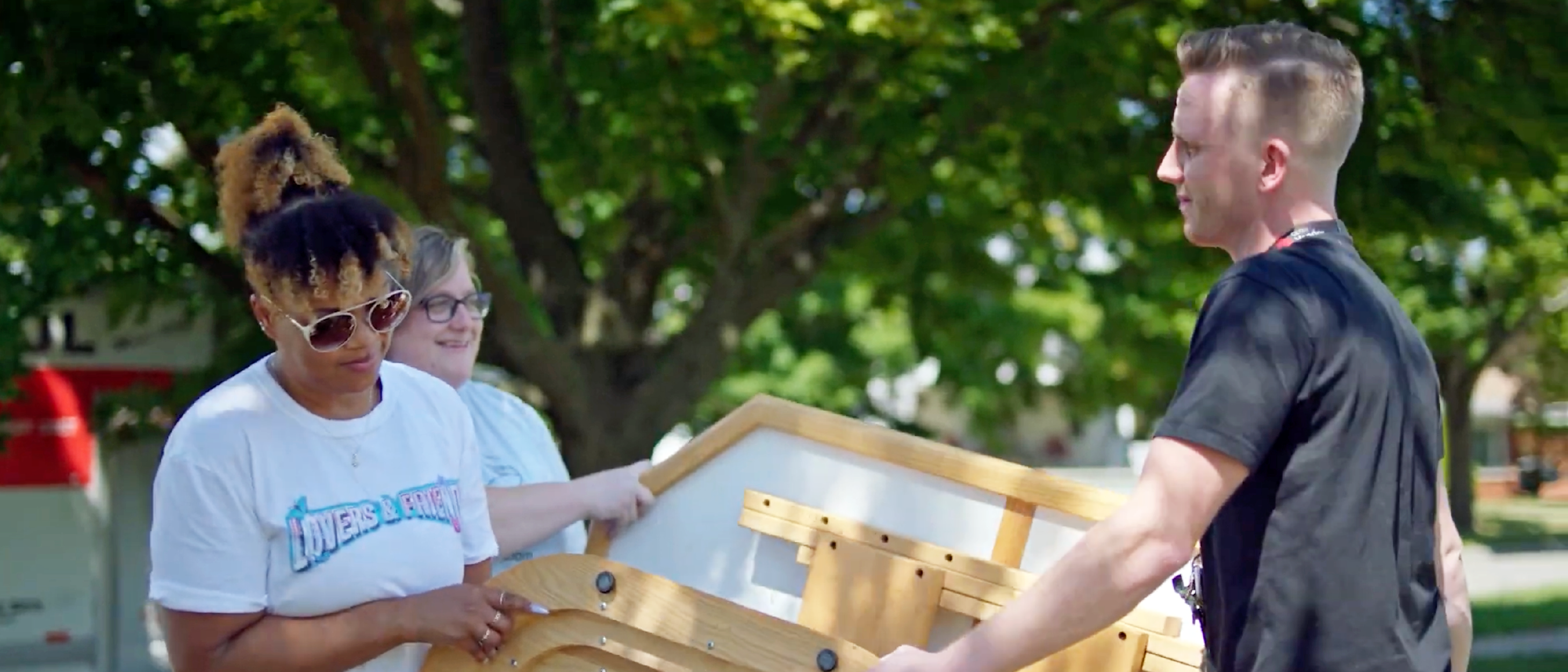
A stable, safe home is the cornerstone for success. This is especially true for refugee populations fleeing their home countries in order to create a better future for their families.
When Samaritas, a health and human services organization that operates one of Michigan’s largest refugee resettlement services, reached out to us for support, we knew we had to find a way to help. We have deep experience in simplifying the complexities associated with securing safe and stable housing, and we wanted to ensure that our newest Detroiters were set up for success.
Last year, Samaritas launched the Detroit Refugee Network (DRN), a coalition of resettlement organizations to provide support services to refugees from Afghanistan and other nations. The DRN would be providing refugees with permanent affordable housing, access to employment programs, cultural and social education, school integration, and more.
To ensure the DRN was successful, Samaritas needed additional capacity to coordinate these programs and aid refugees in resettling. That’s where we stepped in. The Rocket Community Fund coordinated a different kind of investment through Rocket Companies – not with direct funds, but with human capital. We identified Rocket Companies team members with unique skillsets who were then embedded within the DRN to execute housing opportunities, manage relationships with landlords, coordinate move-ins and more. While these team members, who became known as the “Samaritas Seven” were excited to serve the Detroit community in a meaningful way, none of them had any idea just how much the experience would change their lives. The team bonded with each other and created lasting relationships with the refugee families they supported.
“This was an experience I will forever cherish and a catalyst that motivated me to go above and beyond for every family in obtaining their own home,” said Devin McClain, one of the “Samaritas Seven” and Rocket Mortgage team member who served as a Landlord Liaison for the Detroit Refugee Network.
As a result of these efforts, the Rocket Community Fund was presented with a Great Corporate Ambassador Award at Samaritas’ annual Ripples Gala. All of the “Samaritas Seven” were invited and in attendance to receive recognition for their dedication to this work, and the unforgettable impact they have made on the lives of hundreds of refugees in our community. Check out the video below, which aired at the gala.

Each year, we ask our team members to drive our biggest fundraising campaign – the Rocket Companies Community Challenge. It’s different from any other volunteering or giving opportunity we offer, because it’s driven by our team members. Following a nomination period in May, the Community Challenge kicks off in August. All month long, our team members spread awareness and raise money for the nonprofits they love, getting their friends, families, teammates and acquaintances to join the cause by donating or sharing the campaign on social media.
In 2022, Rocket Companies team members nominated an unprecedented number of nonprofit organizations to participate in the Community Challenge. A record-breaking 180 nonprofits joined the Challenge this summer, and the nonprofits that raised the most had the chance to win additional cash prizes. This year, our team members, leaders, their friends and families helped us raise $1.3M in just a little over three weeks! Since 2018, we have raised over $5M to support participating nonprofits across the country. We are proud to have built this platform for our team members so they can highlight the causes and the organizations that mean so much to them, and we look forward to seeing how everyone will step up again next year.
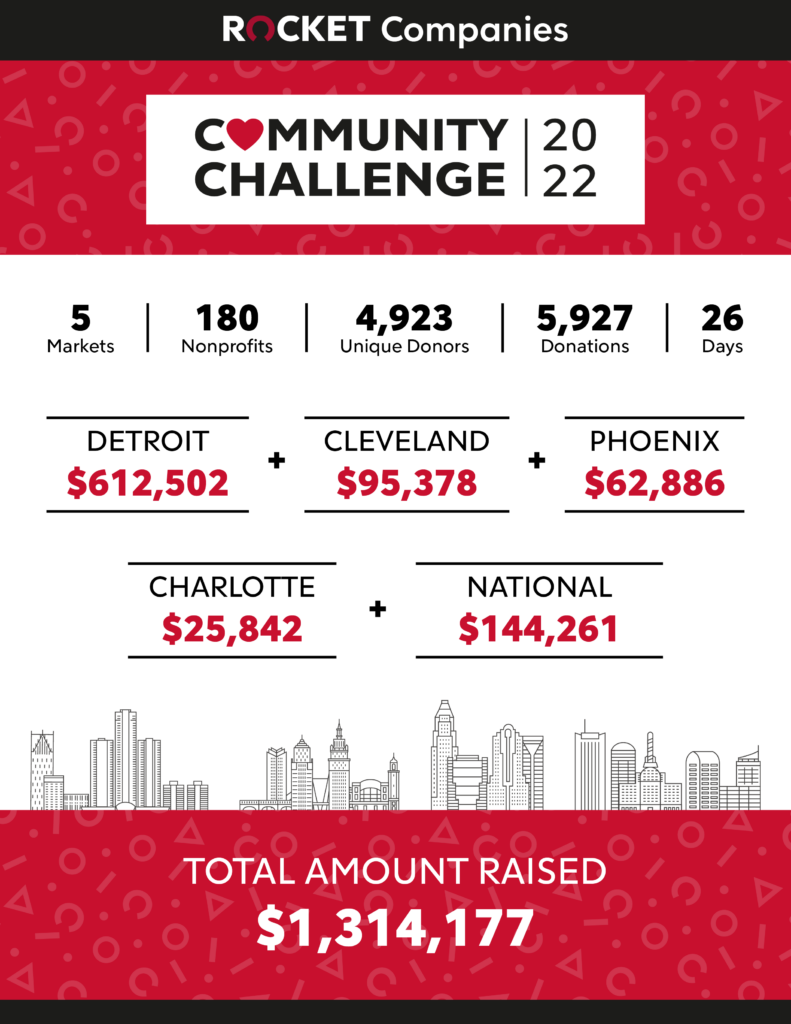

We know our team members are passionate about volunteering, so during the COVID-19 pandemic we created a variety of unique ways for them to support our communities from the safety of their own homes. After two years of remote work, however, there were some team members that simply couldn’t wait to return to in-person volunteering. And in 2022, when it became safe to return to in-person volunteering, they jumped in with both feet!
During the summer, we hosted our first large-scale in-person volunteer event since the pandemic – a four-day experience with Life Remodeled, a nonprofit organization focused on intentional and equitable revitalization of Detroit neighborhoods through repurposing old school buildings, renovating owner-occupied homes and mobilizing large groups of volunteers.
Each day, 100 Detroit team members volunteered to do landscape and cleanup work on the grounds and surrounding neighborhoods of the former Cooley High School. Life Remodeled plans to renovate this building into an opportunity hub, which will provide residents with a gathering place for community building.
For many team members who volunteered, the experience was personal. Some even attended Cooley High School before it closed permanently in 2010. Watch the video below to learn more about their experience and why this event was special for so many.
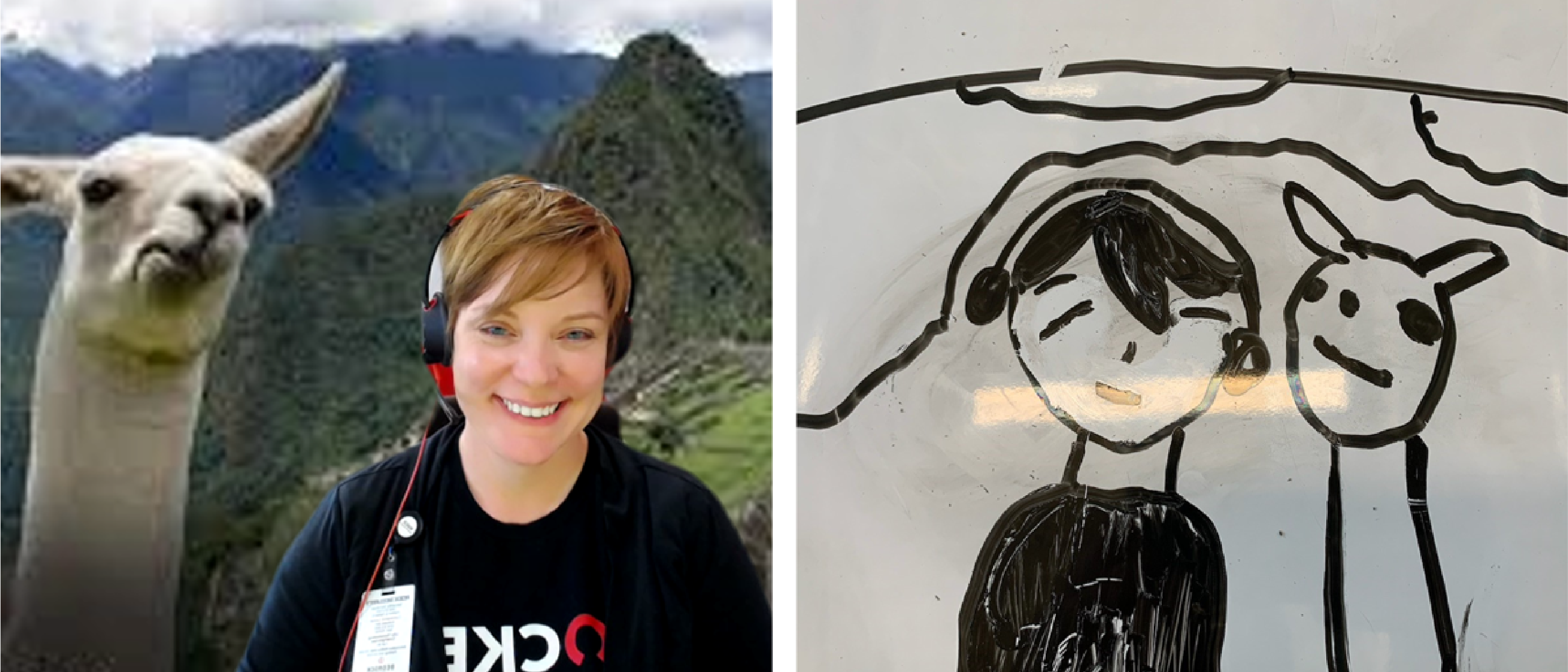
We are continually inspired by our team member’s dedication to making a positive impact in our communities. In 2022, Rocket Companies team members exceeded our expectations, breaking records for volunteer hours and raising hundreds of thousands of dollars for fundraising campaigns.
Our team members love to volunteer in a big way. Amy Wright, a Senior Trainer at Rocket Central, is a prime example of a rockstar volunteer. A passionate volunteer and former teacher, Amy took advantage of a skilled volunteer opportunity with Center for Success, a literacy organization that utilizes mentorship and one on one literacy interventions to support students.
Amy volunteered virtually as a literacy mentor. After undergoing a training session, she was paired with a Detroit third grader whom she tutored for one to two hours on weeknights. Amy used the Center’s digital library to facilitate learning sessions, where she would read with her student and discuss books that interested her. “For our last session together, I chose a Mad Lib for us to fill out. I put up a fun, virtual background featuring a silly looking llama. My student loved my llama and immediately named him Calvin. As we chose the words to complete the Mad Lib, we started to weave a story about her mom hanging out beside a swimming pool with Calvin the llama and drinking smoothies. We had so much fun! The best part was at the end my student showed me the picture that she had drawn of me and my llama. It was super cute, and she did a really good job. She even drew me with my headphones on.”
The experience was rewarding for both Amy and her student and catered to Amy’s teaching skills. Amy hopes to work with the Center for Success again, in addition to exploring other volunteer opportunities that fit her skills and passions. At the Rocket Community Fund, we’re proud to offer our team members experiences like this to fit everyone’s interests and bandwidth. We offer virtual volunteering, skilled volunteering and group volunteering, as well as in-person events that can be done solo or in a group. (Read more about Amy’s story here).
Group volunteering is also a great way for our volunteers to bond with their teammates while making a difference in their community. For example, our Charlotte team members participated in a “Rock the Block” event with Habitat Charlotte supporting 39 new home builds across a nine-acre site to create affordable homeownership opportunities for the families in the local community. The team spent the day together doing landscaping work, assisting with light construction and got to know each other on a deeper level.
“We like volunteering as a group because it builds stronger relationships,” agreed Linda Dufour, an Application Support Engineer at Rocket Homes. She added, “I think it’s a critical part of our organizational culture because it brings people together, increases overall well-being for individuals and communities, and benefits everyone in a terrific way because we’re making a positive impact on the community.”
Rocket Mortgage team member Jewell Bell had similar thoughts. “What I like about volunteering is the kind of human connection that it brings out,” she said. “We all get so immersed in our day-to-day that we take basic needs for granted. Volunteering is another way to give back and to remind ourselves of what’s important – we are blessed and fortunate and it’s important to remember that all it takes is one event to change your circumstances.”
For other team members, volunteering with organizations that align with the causes they care about makes the experience deeply meaningful.
“I’m a veteran, so it’s important to me to get involved in organizations that support veterans and give back to the community that way. It makes me feel better to help them out,” said Rocket Mortgage Triple Crown Purchase Specialist Boone Kowalis, who has volunteered with both local and national veteran organizations.
Whatever their skills or passions, we’re committed to ensuring our team members have a multitude of ways to engage with the communities we call home, and we’re proud to see they ways that they choose to make an impact.

Our mission at the Rocket Community Fund is focused on ensuring that every American has access to safe and stable housing, because housing stability is the foundation for success. At the same time, our commitment to building opportunity and equity in Detroit requires a holistic approach to ensure that residents have access to all the resources they need to thrive and increase their household income. Creating pathways to employment is a critical part of that equation.
In 2022, we advanced existing partnerships and created new ones in support of our goal to provide Detroiters with new opportunities for advancement.
In 2018, the Rocket Community Fund partnered with Urban Alliance, a nonprofit organization that seeks to address systemic barriers to economic mobility for young adults of color and bridge the gaps between education and workforce development. The program has over two decades of success in improving post-high school outcomes for its students, with 100% of UA students graduating high school and more than 90% gaining acceptance to college.
Since bringing Urban Alliance to Detroit, Rocket Companies has served as an “anchor employer” for students and continues to host the most Urban Alliance interns each year. In 2022, we welcomed 35 interns into our offices to gain valuable experiences in wide-ranging roles from creative design to IT. Through their internships, each student gained not only income, but important career-readiness training and one-of-a-kind experiences they could leverage toward a future career. In late 2022, a new cohort of 25 interns joined the company for the 2023 school year and we are already seeing them excel in their roles.
Urban Alliance is not the only education-focused program we supported in 2022. We were also proud to partner with NPower, a national nonprofit focused on creating pathways to economic prosperity for military veterans and young adults from underserved communities through IT training.
Our partnership with NPower supported the organization’s flagship Tech Fundamentals job training program, which provides participants with 20 weeks of instructor-led virtual training and mentoring from senior-level IT professionals. Additionally, the program offers job placement assistance and ongoing support. Program graduates report an average 234% increase over pre-program income – which ties back to our goal to ensure that individuals can build their household income and create a stronger future for their families. A total of 136 young adults enrolled in the program in 2022 and that’s just the beginning! Check out the video below to hear from some of the 2022 graduates and to learn about a new two-year commitment with NPower.
We are excited to continue building partnerships and programs to help level the playing field for Detroit residents and introduce new pathways toward economic mobility.

In the last decade, downtown Detroit has seen an exponential increase in construction, with new developments, retail spaces and offices seemingly appearing overnight. Yet smaller contractor companies in Detroit, primarily run by entrepreneurs of color, have historically been unable to compete with larger contractors, primarily due to access to financing. Only 5% of the contractors in metro Detroit are based in Detroit, which means that the wealth generated from the more than $5 billion in annual commercial construction happening in Detroit is leaving the city and the Black community.
This unfortunate imbalance is the result of systemic racism and perpetuates a vicious cycle in the industry, as BIPOC contractors are often forced to endure higher interest rates on any loans they do receive. When contractors can’t run their business, it creates a shortage of resources to remove blight, repair homes, and bring Detroit neighborhoods back to safe spaces where families can thrive. As part of our commitment to building economic opportunity and equity in our hometown, we wanted to level the playing field and ensure that smaller, Detroit-based contractors had the financing, resources, and necessary training to compete in such a competitive marketplace.
With this vision in mind, the Rocket Community Fund launched the Motor City Contractor Fund, a $10M program operating in partnership with the Community Reinvestment Fund USA, Invest Detroit and Barton Malow Builders. This innovative program represented the first program of its kind to support metro Detroit-based contractors with a suite of services including access to financing, workshops, support for capacity-building and the necessary tools to facilitate their business growth.
The pilot cohort of the Motor City Contractor Fund was comprised of 20 local contractors who were placed into one of three technical assistance categories: Fast Track, Fortified Track and Foundation Track. Lifeline Global Consulting lead the technical assistance side of MCCF and also ran a series of workshops to support the development of each track.
These workshops covered myriad topics – including business growth and planning, labor management, accounting principles, proposal development and more. Notable events in 2022 included “Show Me the Money,” where contractors were able to connect directly with lenders; an “Industry” workshop to identify job prospects and understand the ins and outs of the construction industry; and a major networking event where contractors had the opportunity to meet with vendors and enjoy “speed coaching” sessions with industry experts.
Check out the videos below to learn more about the workshops and how these sessions support participating contractors.
We were incredibly excited to see the impact of the Motor City Contractor Fund on the pilot group, but we are even more excited to see how the program grows under the direction of the Gilbert Family Foundation.

Detroit is one of America’s greatest sports cities. We root hard for our teams and take great pride in coming together to celebrate their successes. But what makes Detroit’s pro sports teams extra special for the Rocket Community Fund is their commitment to serve the community through creative, strategic collaborations. There is no greater example of this than Rocket Mortgage’s partnership with the Detroit Lions.
Nothing is more exciting in football than the red zone: that magical area of the field between the 20-yard line and the goal line where teams step up to make big plays and score big points. For the second year in a row, Rocket Mortgage and the Detroit Lions found a way to make the red zone even more thrilling (and impactful) with the Rocket Mortgage Red Zone promotion in support of Connect 313.
Through the Rocket Mortgage Red Zone, Rocket Mortgage committed to donate $1,000 to Connect 313 every time the Lions scored while in the red zone. Fortunately, the Lions boasted one of the NFL’s best offenses in the 2022 season, which led to lots of opportunities to make an impact. In total, the Rocket Mortgage Red Zone raised $67,000 for Connect 313 by the end of the season. With this funding, Connect 313 continued to build on its commitment to ensure every Detroit resident had access to the digital world and the opportunity it brings.

In 2020, the Rocket Mortgage Classic PGA TOUR event and title sponsor Rocket Mortgage® made the strategic decision to address the digital divide in Detroit by launching its multiyear “Changing the Course” initiative. Changing the Course was created to raise awareness of the digital divide and support transformational efforts to ensure all residents of the community received access to the digital resources they deserve.
The first year of the Changing the Course initiative proved monumental by providing the necessary funding to launch Connect 313, a partnership between the Rocket Mortgage Classic, the Rocket Community Fund, City of Detroit and Microsoft, that collaborates on a citywide, data-driven digital inclusion strategy. Since that time, through the efforts of Connect 313 and affiliated partners, Detroit has gone from being 40% to 67.5% digitally included.
In 2022, the Rocket Mortgage Classic continued to serve as a critical vehicle for awareness to help bridge the digital divide in Detroit, raising $1.57 million for charity with more than $600,000 allocated to Connect 313.
In addition to getting support through the Rocket Mortgage Classic, the Rocket Community Fund works closely with Connect 313. With our support, Connect 313 saw tremendous growth in 2022, expanding its neighborhood tech hubs from 5 to 22, deploying more than $1 million toward supporting nonprofits, and rolling out free internet in 5 Detroit parks.
Additionally, Connect 313 continued efforts to enroll families in the American Connectivity Program, a federal program that provides discounted internet access to low-income households. With our advocacy and support, Connect 313 and partners achieved a milestone in Detroit by enrolling more than 100,000 households in the program. This represents more than 50% of eligible households – the highest rate of adoption in a large city in the entire country.
The Rocket Community Fund looks forward to the fifth annual Rocket Mortgage Classic, and working in partnership to grow the number of households considered digitally included even higher, cementing Detroit’s status as a model for digital inclusion nationwide.

An important part of building stability in our communities is ensuring that everyone has access to the resources they need to be successful, particularly when it comes to high-speed internet, digital devices and digital literacy training. What was once considered a privilege is now a basic requirement for daily life and essential to accessing opportunity in all of its forms.
Since we began focusing on digital inclusion investments in 2020 through partnerships with Connect 313, Human-I-T and others, Detroit has gone from being 40% to 67.5% digitally included. In 2022, we sought to replicate this success to other communities across the country who were facing similar barriers to digital access.
One of those communities is close to home, in Cleveland, Ohio. As of July 2022, 30% of residents did not have internet access of any kind. While the challenges facing Cleveland were a little different than Detroit, we knew that we could help. Together with the Cleveland Foundation, the Rocket Community Fund invested $300,000 toward the establishment of a Digital Equity and Inclusion Manager role with the city – the first of its kind. In December of 2022, Ricardo Reinoso was hired to fill the role.
A longtime community advocate and experienced leader, Reinoso is working closely with the Mayor’s office, Chief Innovation and Technology Officer, and relevant stakeholders to expand affordable broadband access and adoption, boost enrollment in the American Connectivity Program, and help direct funds from the American Rescue Plan Act allocated towards the city of Cleveland’s robust digital equity plans.
The Rocket Community Fund’s support for this position built on our existing commitment to expand digital access in Cleveland through our flagship Neighbor to Neighbor program, which was launched in Cleveland in 2021. This door-to-door canvassing effort, which leverages a network of paid canvassers from local Community Development Corporations (CDCs), is focused on bridging Cleveland’s digital divide and connecting residents to critical housing resources. The program launched with five pilot CDCs and expanded to 11 CDCs in 2022.
We know that the creation of this role and the expansion of Neighbor to Neighbor are just two steps toward bridging the digital divide in Cleveland, but our progress in Detroit shows what is possible. Detroit was once the least connected large city in the United States. In just two years, we managed to change that. It’s a prime example of what we can do when we form strategic partnerships with organizations and people who are equally committed to breaking systemic barriers and increasing equity and opportunity in the communities we call home.

Virtually every aspect of our lives requires some degree of digital connectivity, from education and employment to healthcare. That’s why reliable access to high-speed internet, digital devices and digital training is essential. Unfortunately, far too many Detroit residents are caught in a “digital divide,” excluding them from opportunities afforded to those with the ability to get online.
Digital inclusion is also a fundamental component of housing stability. Housing resources and access to finance is often exclusively available online. As a part of our housing mission, we are laser focused on increasing access to the internet and digital devices in Detroit.
One of our key partners in tackling this important work is Human-I-T, a nonprofit that recycles e-waste in the form of digital devices which are then refurbished and donated to residents who need them. Human-I-T opened their Detroit warehouse with the support of Rocket Community Fund in 2020, and Rocket Companies is currently the largest donor of e-waste in Detroit.
Through our partnership, Human-I-T picks up around 10 to 20 pallets of e-waste from our Detroit offices every quarter. We also work with Human-I-T to schedule pickups in our other office locations. In 2022, Rocket Companies donated 41 pallets containing 231,223 pounds of e-waste. That’s equivalent to the weight of 56 cars!

These donations solve for two issues. First, they keep e-waste out of landfills, reducing pollution and conserving natural resources. Second, Human-I-T refurbishes the devices for resale, using the profits to provide new devices to underserved communities. Until recently, there was no brick-and-mortar location anywhere in the country for Human-I-T to sell devices directly to residents.
In the fall of 2022, Human I-T announced the launch of their first ever retail location in the country, to open soon in our hometown of Detroit. The announcement came during Digital Inclusion Week, a national initiative highlighting digital inclusion efforts across the country with the aim of spreading awareness about digital resources and campaigns to end the digital divide.
The planned Human I-T storefront will offer low-cost Chromebooks, laptops, desktop computers and tablets, along with low-cost internet options, free tech support and digital skills training. We are excited for the opening of the brick-and-mortar store because it will solve a critical need for Detroiters who have no other place to purchase low-cost devices or receive the digital literacy training they need to use them.
Thanks to partners like Human I-T, we’re creating a more equitable community for Detroit families, where new opportunities to succeed are no longer out of reach.

The Rocket Community Fund aims to simplify complex and inequitable systems to ensure that every American has access to stable and healthy housing. In Detroit, one of these systems is the Wayne County Tax Foreclosure auction. For more than a decade, the Rocket Community Fund has invested significant resources in reducing the number of homes entering the tax auction and protecting Detroiters from losing their homes. This includes renters, who are uniquely vulnerable to displacement because they are not responsible for making property tax payments.
In 2017, the Rocket Community Fund launched the Make It Home program to provide eligible Detroiters who occupy tax-foreclosed homes the opportunity to become homeowners instead of risking eviction. The program leverages the City of Detroit’s “right of refusal,” allowing the City to purchase properties before the tax foreclosure auction for the value of the back taxes owed. These properties are then sold to the United Community Housing Coalition using philanthropic funding from the Rocket Community Fund. Residents pay an average of less than $10,000 to become homeowners through this program.
During the first two years of the COVID-19 pandemic, the tax auction was suspended to ensure vulnerable residents were not displaced. However, the auction returned in 2022. Fortunately, so did Make It Home.
In October 2022, the Rocket Community Fund, alongside Mayor Mike Duggan and the United Community Housing Coalition (UCHC) announced the addition of 239 Detroit families to the program. Since Make It Home’s inception, 1,396 families have avoided displacement as a result of tax foreclosure.
During the Make It Home press conference, Detroit resident Barbara Sledge spoke about her participation in the Make It Home program. Sledge explained that she had lived in her Eden Gardens home for four years and had always paid her rent on time. She even used her own money to fix up the home, but was still at risk of being evicted when her landlord lost the home due to nonpayment of taxes. Instead, thanks to Make It Home, she became a homeowner for the first time at age 52.
“Make It Home took a lot of stress off me because I wanted to stay in Detroit and didn’t want to lose my home. I always treated this home like mine, and I’m glad I can finally call it mine,” she said. “The entire experience of dealing with this program and the partners, has been fantastic. I’m looking forward to eventually passing this home down to my children one day and continuing to thrive and support my neighborhood.”
Throughout the program, residents also have access to home repair grants and loans. Through grants and 0% interest loans, UCHC helps residents address home health and habitability home repairs. Since the launch of the Make It Home Repair program, 1,025 repairs have been completed in more than 322 homes.
Check out the video below to learn more about the program and how it impacts Detroit residents.

The Rocket Community Fund’s housing investments span a spectrum of interventions – from preventing homelessness to reducing displacement to creating pathways to homeownership. While our housing investments are diverse, our strategy for each remains the same. We seek to discover new and innovative approaches to removing institutional and systemic barriers to stable and healthy housing.
One of the most persistent barriers related to homeownership is the racial wealth gap. For years, systemic racism and racial injustice have decimated Black wealth, leading to unequal outcomes in homeownership. In fact, the Black-white homeownership gap is now wider than it was when race-based discrimination against homebuyers was legal.
Because we recognize how important financial stability, especially homeownership, is to building wealth, we sought to address this challenge with a unique initiative called the Rocket Wealth Accelerator program. Created alongside our partners at Local Initiatives Support Corporation (LISC), the Rocket Wealth Accelerator is a $2 million investment that will serve resident clients in Detroit, Cleveland, Milwaukee, and Atlanta.
The Rocket Wealth Accelerator provides clients with coaches who work with them to improve their ability to meet emergency needs, build their credit, and grow generational wealth. In addition to financial coaching, the program also provides matching dollars for participants’ savings plans, with up to $500 for people with large-dollar goals such as purchasing a home or vehicle and up to $300 for those with short-term or emergency savings goals.
The Rocket Wealth Accelerator leverages the infrastructure of LISCs Financial Opportunity Center (FOC) network in Detroit, Cleveland, Atlanta and Milwaukee. LISC has a network of more than 130 centers embedded in community-based organizations across the country, which offer job training and placement services, financial coaching and education, income supports and other services aimed to help families boost their savings, build credit, reduce expenses and make sound financial decisions that increase assets.
The Rocket Wealth Accelerator is currently offered at the following FOC sites:
Participants in the Rocket Wealth Accelerator will also receive access to a free, three-month subscription to Rocket Money, a part of Rocket Companies. With Rocket Money, Rocket Wealth Accelerator participants will have a better understanding of their current economic situation while they work with coaches to improve their outlook on their path to homeownership and wealth creation.
In the press release announcing the investment, LISC CEO Lisa Glover reflected on the importance of the program.
“For far too many, the American dream of financial security feels out of reach. Our partnership with the Rocket Community Fund, which is focused on pairing financial coaching with products designed to accelerate savings, is exactly the kind of investment in economic empowerment that can help close our country’s widening wealth gaps and equip more families of color to build generational wealth.”
Over the next three years, the Rocket Wealth Accelerator aims to:
We cannot wait to see how this investment supports residents in these communities on their paths to stability, security and prosperity. Check out the video below to learn more about this innovative program!

Historically, Detroit has been distinguished as a majority-homeowner city. However, that hasn’t been the case in the last decade, where a slim majority of residents were renters. That balance shifted again according to the most recent census data, which showed an estimated 51.3% of Detroit housing units were owner-occupied.
Regardless of the specific numbers, it is clear that a significant portion of Detroit’s population relies on rental housing and, as such, is uniquely vulnerable to certain types of housing instability. As an organization focused on creating stable and secure housing in our communities, we are acutely aware of the important role rental housing plays and have made it a priority to invest in programs that support renters and ensure they continue to remain housed.
At the Rocket Community Fund, we believe that knowledge is the foundation of understanding, and understanding is the foundation of action. We wanted to make sure we had the right data to design future interventions in a way that would make the greatest impact possible, so we chose to collaborate with experts to investigate the rental landscape. Specifically, we commissioned a study by Stout, a global investment bank and advisory firm, to understand the potential impact of a citywide eviction defense program.
Stout’s groundbreaking study, The Estimated Economic Impact of an Eviction Right to Counsel in Detroit, found that every dollar invested for a right to counsel would realize an economic benefit of at least $3.52. It would take approximately $16.7 million to holistically and comprehensively address the issue, and the City would realize a $58.8 million reduction in social safety net responses to disruptive displacement, in addition to providing stability for renters.
This eye-opening research provided the basis of the Detroit Eviction Defense Fund, a major $12 million, three-year investment from the Gilbert Family Foundation into three Detroit-based organizations to provide low-income Detroit families facing eviction proceedings with legal representation. The program has also allocated an additional $1 million to fund a long-term study into the efficacy of the program as well as the eviction defense ecosystem in Detroit.
The Rocket Community Fund also funded a study by Detroit Future City, alongside the Erb Family Foundation, to better understand Detroit’s rental market. Understanding the Rental Landscape: A Profile Analysis of Detroit Landlords to Inform Lead-Safe Housing Policy, had some unique takeaways that allow us all to better understand who owns rental properties in Detroit.
Specifically, the study found that most landlords only own one or two properties, most properties are owned by those with a Detroit address, there are limited connections to the City’s formal rental housing system, and there are only a few landlords who own a large number of properties.
This knowledge allows us, the City, philanthropic partners and nonprofit organizations to better advocate for interventions and built a system that is equitable for all residents – regardless of whether they rent or own. We are excited to continue collaborating with a wide range of stakeholders on interpreting this data and developing the most impactful programs possible.

For more than a decade, the Rocket Community Fund has worked across the city of Detroit to invest in wide-ranging programs that address the unique needs of our community. Through constant analysis and deep collaboration, we have been fortunate to test new ideas, refine our capabilities, and maximize our impact. However, as the nation’s largest mortgage lender, we have the opportunity and responsibility to drive systemic change at home and across the country.
With the highest rate of economic inequality and one of the lowest rates of upward mobility in the country, Atlanta is in high need of housing stability interventions. To begin, we collaborated with the Atlanta BeltLine Partnership (ABP) and Atlanta Neighborhood Development Partnership (ANDP) on investments focused on ensuring safe and stable housing for Atlanta residents.
The Atlanta BeltLine is one of the largest, most wide-ranging urban redevelopment programs in the United States. Boasting a massive network of parks, trails, commercial developments and housing, the BeltLine is built on an historic 22-mile railroad corridor that circles the core of the city and aims to enhance mobility, foster culture, and improve connections to economic opportunity for Atlanta residents.
While the BeltLine is an enormously exciting project for the city of Atlanta, it has led to increased property values in areas adjacent to the development, which poses a challenge for lower income residents.
That’s why we invested $500,000 into ABP’s Legacy Resident Retention Program, which helps owners living in priority areas afford the increase in property taxes through the 2030 tax year. This investment will ensure dozens of households in ABP’s equity priority subareas are able to stay in their home.
In addition to our commitment with ABP, we also contributed $250,000 toward Atlanta Neighborhood Development Partnership’s “Closing the Gap” plan. This initiative is focused on broadening access to affordable housing in Atlanta, with the specific goal of creating and/or preserving 2,000 units of affordable housing by 2025.
While these 2022 investments represented our first foray into the Atlanta market, we are excited to continue expanding our footprint in the city with the launch of our flagship Neighbor to Neighbor program in 2023. Through Neighbor to Neighbor’s intensive canvassing and data collection efforts, we will gain the information needed to make even more impactful investments in the future and help even more Atlanta residents enjoy stable and secure housing.
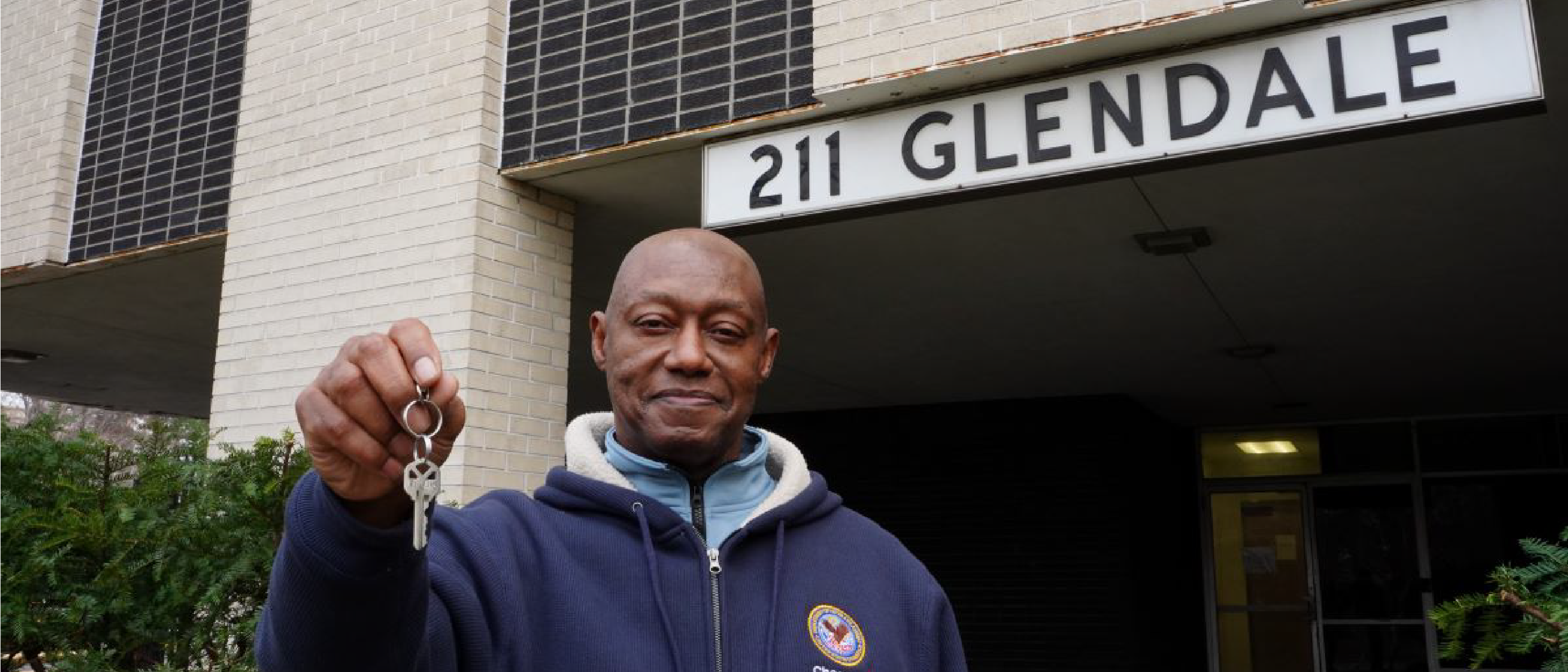
The Rocket Community Fund is proud to be a lead sponsor of Built for Zero, a national movement to measurably and equitably end homelessness. Since joining the movement in 2018, our support has helped more than 100 Built for Zero communities across the country achieve reductions in homelessness by changing the way they respond to the problem with a more collaborative, data-driven approach. We’re particularly proud of the work that we’ve been able to support in our home community of Detroit, where our investments have helped power a 60% reduction in veteran homelessness (between December 2017 and December 2022).
One of the key values shared by both the Rocket Community Fund and Built for Zero is the belief that there is always room for improvement. At the Rocket Community Fund, being “Obsessed With Finding A Better Way” is one of our core ISMs, or company values. Likewise, the Built for Zero process is centered on using real-time data to rapidly test new ideas and understand if those efforts are working. This focus on finding new solutions led to a unique investment in May 2021.
In partnership with The Home Depot Foundation, the Rocket Community Fund supported the renovation of a transitional housing complex into permanent supportive housing for veterans. This project addressed an important need in Detroit by making more permanent housing accessible and decreasing long-term reliance on transitional housing. Over 18 months, teams worked through the turmoil of the COVID-19 pandemic and supply chain disruptions to complete the renovation.
In 2022, the Rocket Community Fund commissioned the non-profit Humble Design to put the finishing touches on the project by renovating two large common area spaces that will be used by residents to rest, relax and gather with their peers. Humble Design provides fully furnished home interiors for individuals and families transitioning out of homelessness and was excited to join our mission, lending two of its talented designers to make the space feel as homey as possible.
Check out the video below to see how the Humble Design team worked to create a warm, dignified space for residents to enjoy. The video also provides more information about the 211 Glendale project, including how the Rocket Community Fund, Built for Zero, and Detroit Rescue Mission Ministries collaborated to make it a success.
Once the renovations were complete, service providers in Detroit began to direct potential tenants to 211 Glendale. The first veteran to move into the building was Freddie Tucker, a former US Army soldier.
Though Tucker completed his service in 1983, he was unaware of many of the VA benefits eligible to him until the last few years when he fell on difficult times and began experiencing homelessness. In early 2022, Tucker stayed in a homeless shelter in Detroit for three months, but said he was determined to progress out of that temporary situation. Detroit Rescue Mission Ministries connected him with a mental health counselor and told him about the new units at 211 Glendale that would soon be available. With their support, he moved into his new, permanent apartment in August.
Tucker considers the apartments a blessing and has encouraged other veterans experiencing homelessness to consider them. As he explains, it’s a place where he actually wants to be.
“To me, it’s more like a place where I call home. I’m proud to be here everyday,” said Tucker. “When I was in the shelter, I wouldn’t go check in until it was dark. When I would get off work, I would go to the park and park my car and just sit. But here, when I get off work, I come straight home because I have somewhere I want to be.”
Check out the video below to hear Mr. Tucker’s full story, which is inspiring even more veterans to move into 211 Glendale and helping us drive toward our goal of reaching Functional Zero for veteran homelessness in Detroit.
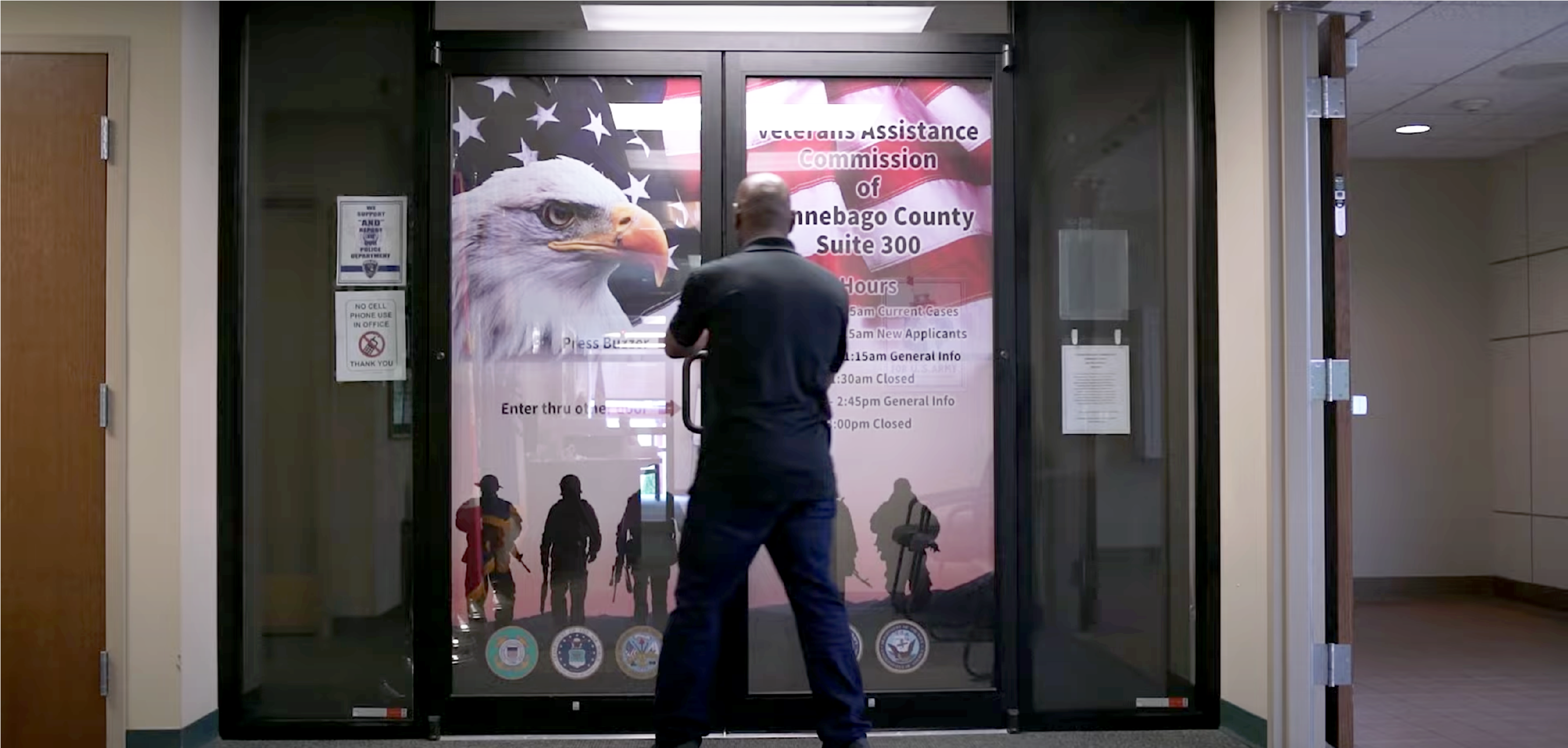
The core of the Built for Zero movement’s success is how it trains communities to rebuild their homelessness response systems in a way that is data-driven, collaborative and focused on one clear, shared goal: reaching Functional Zero.
To succeed in Built for Zero means rethinking old ways of doing things and experimenting with new approaches that rely on innovation and creative partnerships. In Detroit, the Rocket Community Fund has made many direct investments to help identify meaningful solutions to address veteran homelessness. For example, we invested in transitioning temporary or transitional shelter housing into permanent supportive housing for veterans in Detroit.
Ultimately, we’re committed to being the most effective partner we can be – whether that means making direct investments in housing or providing critical technical support through skilled volunteering. In the video below, we talked with Built for Zero leaders about our strategic partnership, our shared vision for housing stability, and what makes partnerships effective in the fight to end homelessness
One example of the kind of unique collaboration that Rocket Community Fund was able to bring to Built for Zero in 2022 was the development of the Homeless Resource Locator tool, a searchable, user- and accessibility-focused map developed to help people experiencing homelessness quickly and easily locate contact information for their nearest homeless service provider.
The idea to create this tool came in response to an increase in direct outreach to both Rocket Mortgage and Community Solutions for homelessness services support. A key component of Rocket Mortgage’s support for Built for Zero has been the launch of several high-profile national advertising campaigns designed to raise awareness about the issue of chronic and veteran homelessness. As the campaigns ramped up, both organizations began receiving numerous requests for help from veterans across the country.
Because Built for Zero is about systems improvement and not direct services support, we needed a solution that could connect vulnerable individuals with more tangible resources in their community. Community Solutions connected with the Rocket Community Fund’s Volunteer Engagement and Giving team, which identified several technology team members from across Rocket Companies who were interested in providing their expertise to address the challenge.
Working alongside the experts at Community Solutions, our skilled volunteers built the Homeless Resource Locator, which was launched in November 2022. The tool uses Google Maps to display information for more than 900 homeless service providers across all 50 states and territories and was intentionally designed with a focus on accessibility and easy mobile use.
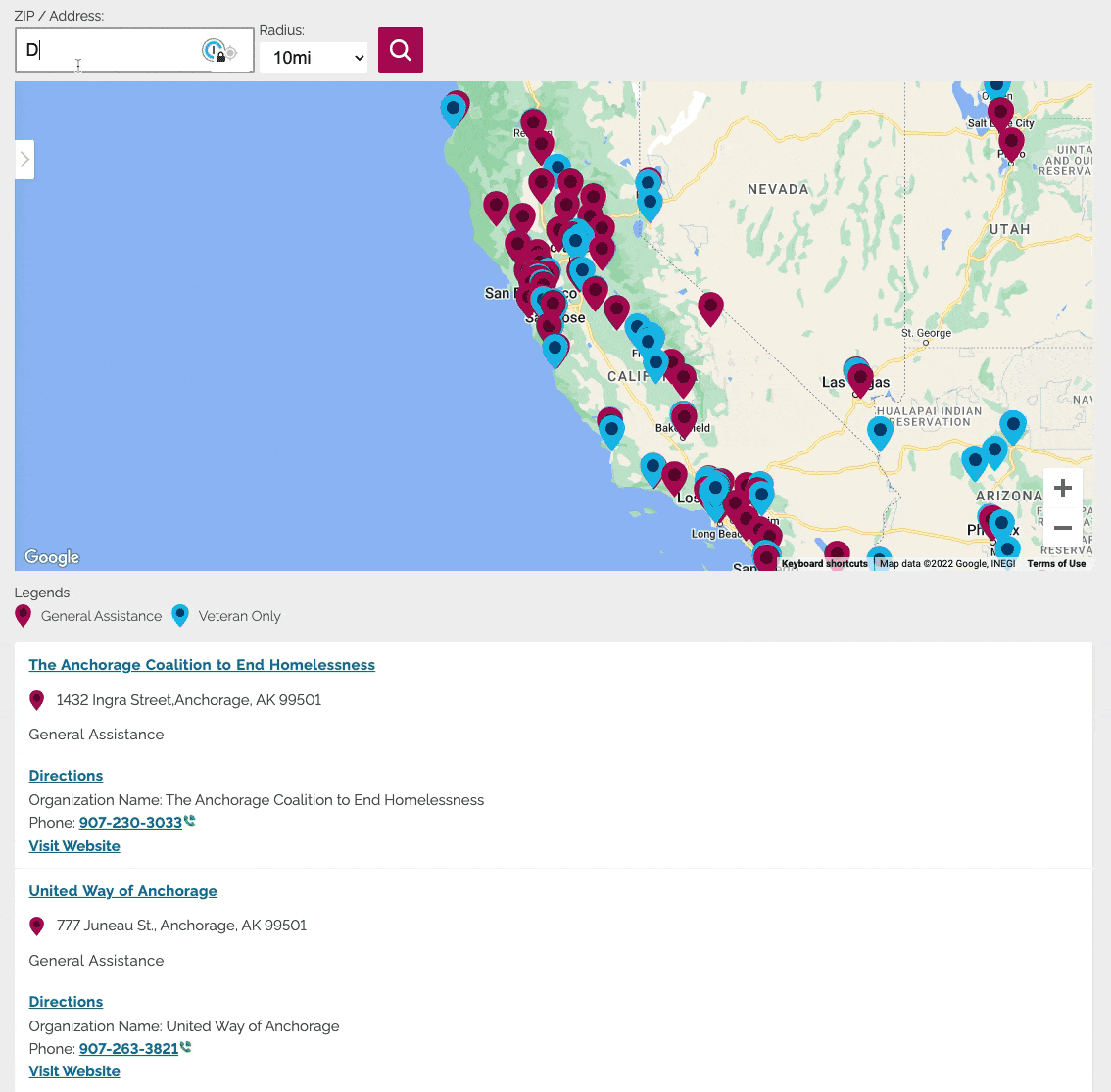
“We knew the people we were trying to reach were already facing difficulties, so we didn’t want a complicated design or non-essential features getting in the way of usability,” explained Harold Jankowiak, Senior Product Owner and project lead at Rocket Companies.
“We wanted our technology to be able to assist those who may have physical or cognitive limitations, so everyone could self-serve and not be dependent on anyone to connect them with supportive services. Accessible design is just one more thing we can do to help people live independent lives.”
Since its creation, the tool has received praise from the US Department of Veterans Affairs and has even been linked to their website where it can reach an even broader audience of vulnerable individuals. By connecting more veterans with programs and services directly, we’re excited to see how this tool will help further Built for Zero’s mission of ending veteran and chronic homelessness for good.
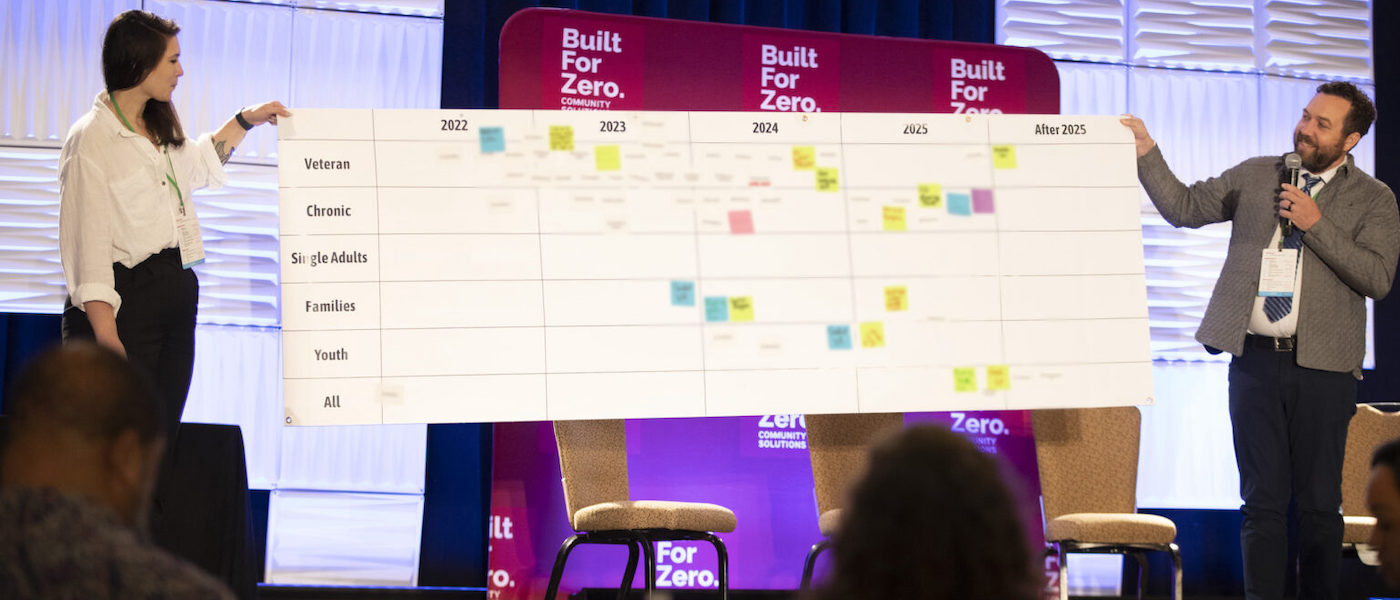
Since 2018, Rocket Mortgage (via the Rocket Community Fund) has been a lead partner in Built for Zero, a national movement to measurably and equitably end homelessness. In 2022, our support for Built for Zero helped the movement continue to expand and make an even greater impact in the lives of men, women and families experiencing homelessness across the country. Since Built for Zero began, more than 155,000 people have been housed by participating communities. And this number will continue to grow as more communities join the movement!
In 2022, nine new communities joined Built for Zero for a total of 105 participating communities. Among these communities, 14 have achieved the incredible distinction of reaching “Functional Zero” for a population, which means that the number of people experiencing homelessness at any time does not exceed the community’s proven record of housing at least that many people in a month. In other words, homelessness is rare, brief and nonrecurring within a community.
The Built for Zero model requires communities to reorient their homelessness response systems with a more collaborative, data-driven approach that is focused on driving continual reductions. One of the hallmarks of Built for Zero is the simple recognition that every community is different. Homelessness in Detroit may look different from homelessness in Anchorage, which is why accurate, by-name data of individuals experiencing homelessness is so important for developing effective reduction strategies.
But just because homelessness may look different in two places doesn’t mean those communities can’t still learn from each other. That’s why Built for Zero hosts a twice-annual Learning Session where all participating communities are invited to come together, share best practices, workshop problems, get fresh ideas and celebrate the collective success of the movement.
The Rocket Community Fund was honored to join the 2022 Learning Session in Chicago, which was also the first in-person learning session since the COVID-19 pandemic began. While there, we met with other partners, connected with community leaders and learned from experts on the critical issues driving homelessness in America today. It was an inspiring and affirming event that reminded us that we all have a role to play in ending homelessness. Check out the video below for a highlight of the Chicago Learning Session and what makes this event so special for Built for Zero communities and partners.
